
13 - 19 December 2023
(Issue 47)
Sponsored by:

Readers who encounter problems with the email version of the WIN can
view the latest web edition here
CONTENTS
Section I - CURRENT INTELLIGENCE NEWS HIGHLIGHTS
- Official NORAD Santa Tracker Goes Live 24 December - NORAD, 19 Dec 23
- GCHQ Christmas challenge: Agency reveals 2023 codebreaker - BBC, 13 Dec 23
- DIA to release new AI strategy - Federal News Network, 13 Dec 23
- How Russian intelligence services have taken over Wagner's operations in Africa - Le Monde, 12 Dec 23
- NGA plans ‘significant’ awards for commercial data services - Federal News Network, 13 Dec 23
- China's Spies Offered $15 Million for Taiwan Army's US Chinook Helicopter - Newsweek, 12 Dec 23
- In-Q-Tel Opens First APAC Office in Singapore to Invest in Deeptech Startups - Deal Street Asia, 14 Dec 23
- Czech counterintelligence identifies Russia and China as the nation’s greatest threats - Expats CZ, 12 Dec 23
- House Approves Four-Month Extension Of Feds’ Warrantless Spying On Americans - The Federalist, 15 Dec 23
- Spy agency set to transfer counterespionage authority to police, but doubts remain - Korea JoongAng Daily, 12 Dec 23
- Canada's top spy reflects on his uneasy year in the spotlight - Canadian Broadcast Corporation, 16 Dec 23
- NDAA directs officials to establish ‘Intelligence Community Innovation Unit’ - Federal News Network, 15 Dec 23
- The D.C. National Guard Starts Recruiting for Its First Military Intel Unit - Clearance Jobs, 18 Dec 23
- Counterespionage Corner - A collection of recent material on arrests, convictions, expulsions, and more...
- Cyberespionage Collection - Newly identified actors and operations, countermeasures, policy, other...
Section II - DEEP DIVES
(Research Papers, OpEds, Analysis, Podcasts)
- China's Espionage Recruitment Motivations: Getting Rid of the M.I.C.E. - European Intelligence Academy, 12 Dec 23
- Homeland Threat Assessment 2024 - DHS Office of Intelligence and Analysis, 12 Dec 23
- Report of Investigation (S9691) [The Texiera Incident] - Unauthorized Disclosure of National Security Information - Inspector General of the Department of the Air force, August 2023 (released to public 12 Dec 23)
- U.S. Intelligence Sharing With Israel Deserves the Same Scrutiny as Arms Transfers - Lawfare, 14 Dec 23
- Requirements and Priorities: an under-examined mechanism - Brunel Centre for Intelligence and Security Studies, 13 Dec 23
- Beyond the SCIF: Countering Chinese Influence Operations on American Soil - Hudson Institute, 12 Dec 23
- AI Is Replacing 007 in the Espionage Arms Race: A conversation with Harvard’s Calder Walton - Bloomberg, 15 Dec 23
- Shifting Sands of Intelligence: Israel's Aman and Shin Bet in the Maze of Security, Strategy, and Statecraft - Real Clear Defense, 12 Dec 23
- Intelligence liaison under scrutiny, part I: Cyprus sigint - Tom Griffn on Intelligence History, 14 Dec 23
- Who is watching Britain’s spies? - The Spectator, 11 Dec 23
- National Intelligence Centre: Spain’s Intelligence Service - Grey Dynamics, 15 Dec 23
- Why US is touching the RAW nerve - The Tribune, 18 Dec 23
- SpyCast: The Latest from International Spy Museum Historian Andrew Hammond, PhD. and his guest experts on HUMINT, SIGINT, IMINT, OSINT, and GEOINT
Section III - FORMERS' FORUM
(Legacy Intel Practitioners' Informed Perspectives)
- Putin’s propaganda machine was in full force during his annual press conference, but inflation emerged as a key concern among the crowd. And the West should maintain the pressure. — Former Acting CIA Dep. Dir. for Ops and Arkin Group President Jack Devine, In Other News
- Major Powers Struggle to Deter Houthi Ship Attacks | Venezuela-Guyana Border Dispute Simmers | Tensions Between Transparency & Security in Biden’s EO on AI | Will Latest Sudan Ceasefire Endure? | Sahel Burns as World Focuses Elsewhere — Former FBI Special Agent and Soufan Group CEO Ali Soufan, Intel Brief
- Advising the President: Former National Security Advisors Tom Donilon and Steve Hadley — Former CIA Acting Director Michael Morell and former CIA Chief Operating Officer Andy Makridis, Intelligence Matters: The Relaunch
- Trump’s Stated Goals for the U.S. Intelligence Community: Assessing the Impact by former FBI Special Agent for Counterintelligence Asha Rangappa and former CIA Executive Marc Polymeropoulos - Just Security, 18 Dec 23
- What the CIA can teach us about caring for one another by former CIA Chief of Station Daniel N. Hoffman - Higher Ground Times, 14 Dec 23
- Initial Lessons from the Rocha Case: The United States Must Remain Alert for Foreign Intelligence Threats by David Aaron, former Acting Dep. Chief for Counterintelligence, National Security Division, DOJ - Just Security, 14 Dec 23
- Deterrence and Dissuasion in the Taiwan Strait by Lonnie Henley, former Defense Intelligence Officer for East Asia, Senior Defense Intelligence Analyst for China, and National Intelligence Collection Officer for East Asia - Foreign Policy Research Institute, 12 Dec 23
- More Than 30 Americans Died on October 7 — Where Is the Outrage? by former CIA Executive Marc Polymeropoulos - The Messenger, 14 Dec 23
Section IV - MEMBER CONTRIBUTIONS
(All Categories)
- Article: Intelligence Researchers To Study Computer Code for Clues To Hackers' Identities - Wallstreet Journal via Slashdot, 15 Dec 23
- Article: Ex-FBI counterintelligence official gets over 4 years in prison for aiding Russian oligarch - Politico, 14 Dec 23
- Article: Scoop: Israel's Mossad chief met Qatari PM to resume hostage talks - Axios, 16 Dec 23
- Article: Chinese spies recruited European politician in operation to divide west - Financial Times, 15 Dec 23
- Article: Classified binder on Russian meddling went missing as Trump left office: Reports - The Hill, 15 Dec 23
- Article: MI6 Chief Thanks Russian State Television for Its 'Help' in Encouraging Russians to Spy for the UK - Military.com, 12 Nov 23
- Article: At least 70 arrested in China Rocket Force Scandal - Asia Sentinel, 13 Dec 23
- Article: Exclusive: Leaked NSA Doc Reveals Massive Woke Glossary Pushing Critical Race Theory, Gender Ideology At Intel Agency - Daily Wire, 15 Nov 23
- Exhibit: Spies in the Skies: Second World War Aerial Reconnaissance - Imperial War Museums, U.K. 27 Dec 23 - 25 Feb 24
- OpEd: What happened the day IU legend Bob Knight spoke to CIA senior officers - Indy Star, U.K. 14 Dec 23
- Article: He was taken hostage in Iran. Now, Thomas Ahern, ex-CIA spy, tells his story. - Washington Post, 17 Dec 23
- Article: A top-secret Chinese spy satellite just launched on a supersized rocket - Ars Technica, 15 Dec 23
Books: (Forthcoming, New Releases, Overlooked)
- Spartan Scytale and Developments in Ancient and Modern Cryptography by Martine Diepenbroek (14 Dec 23)
- Spy for No Country: The Story of Ted Hall, the Teenage Atomic Spy Who May Have Saved the World by Dave Lindorff (28 Nov 23)
- Agents of Influence: How the KGB Subverted Western Democracies by Mark Hollingsworth (16 May 23)
Book Review: Black Vault by former CIA analyst Alma Katsu - Amazon Original Stories (2023)
True Intelligence Matters in Film: Spycraft, Episode 5: Covert Communication - Marek Bures, Maria Berry, Jan Spindler (2021)
Intelligence in History - A Collection of Recent Content
Infographic: Mapped - Interest in Generative AI by Country - Visual Capitalist, 02 Dec 23
Walking Tours: "The Spies of Embassy Row" and "Spies of Georgetown" - Washington, DC. (Sundays, Dates/Times Vary)
Section VI - Obituaries and Classifieds
(Research Requests, Academic Opportunities, Employment)
- Bill Bauhaus, Career NSA Officer
- Russ LeFevre, Decorated Career CIA Officer
- Dave Hartmann, Decorated Career NSA Officer
Research Requests and Academic Opportunities
- National Intelligence Summer Academy (NISA) for High School Students 15-19 July 24 in Cummings, GA. Deadline 15 April 2024
- Call for Interviews: Author of forthcoming book seeks conversation with intelligence officers who have worked on China during their career
- Call for Information: CIA’s Office of Soviet Analysis (SOVA) 1981-1992
- Call for Information: Al "Albert" Purdum, stationed at Arlington Hall 55, Defense Language School - Albanian 55-56, NSA Linguist, Sr. Cryptologist 57-95
- Call for Information: Octavio Bermudez, State/Commerce Attache Latin America, Crosley Broadcasting - 1922-1942.
- Call for Information: COS Manila in November 1996
- Call for Information: MACV/SOG Sgt Major Charles “Chuck” Remagen
- Call For Sources: Intelligence activities in Grenada and the southern Caribbean between 1979 and Operation Urgent Fury, Leonard Barrett
- Call For Articles: AFIO Journal, The Intelligencer
- Wanted: Retired Federal Government Employees - National Security Agency - Fort Meade, Maryland
- Assistant Professor - Intelligence Studies - Embry-Riddle Aeronautical University, Arizona
- 30 Jan 24, 1900 (PST) - Former CIA Director General David Petraeus on challenges in Ukraine and the Middle East - In-Person, Yorba Linda, CA - AFIO Los Angeles Chapter; Dinner after
Events from Advertisers, Corporate Sponsors, Others
See the AFIO Calendar of Events for scheduling further in the future.


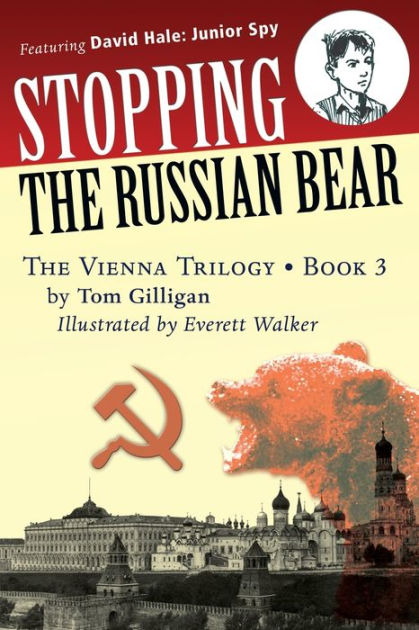
The Vienna Trilogy by Tom Gilligan (2023)
In the summer of 1947, Europe was in turmoil. Displaced persons were everywhere. The Red Army occupied Poland, Czechoslovakia, parts of German, and other countries. Austria was divided into zones – Russian, American, British, and French. The NKVD secret police followed on the heels of the Red Army, arresting, kidnapping, even killing those who opposed the communists. This is the setting for Tom Gilligan’s trilogy focused on 11-year old David Hale, whose father, a doctor, was deeply involved with medical treatment for refugees, and also was a former intelligence officer during World War II and continued to support American intelligence in post-war Austria. With his mother and sister on vacation in the US that summer, young David became involved in several intelligence support operations. The trilogy – Escape to the West, Nazi’s on the Run, and Stopping the Russian Bear – recount in fascinating detail how David assisted his father, and an American Intelligence agent, in three gripping adventures.
Gilligan, a former CIA DO officer, has written a book appropriate for young readers. The characters are well drawn. The stories are well constructed and gripping. Each of the trilogies is a little more than 100 pages. The author explains the sophisticated words used and espionage terminology and concepts in footnotes, which is a clever tool for young readers to learn vocabulary and understand how HUMINT works. Gilligan also clearly explains the geo-political situation of 1947 in Europe via conversations between David and his father.
The Vienna Trilogy would make an excellent holiday present for young readers ages 10 to 14. On Amazon, $26.99 for all three books in one volume. Each of the books are also available separately.
Reviewed by Peter C. Oleson, Senior Editor, The Intelligencer.
ACKNOWLEDGEMENTS
The WIN editors thank the following contributors of content for this issue:
JK, TG, GR, JA, FR, CP, S, FH, JU, EB
Readers are encouraged to suggest material for any section of the WIN to:
winseditor@afio.com
The WIN editors thank the following contributors of content for this issue:
JK, TG, GR, JA, FR, CP, S, FH, JU, EB
Readers are encouraged to suggest material for any section of the WIN to:
winseditor@afio.com
DISCLAIMER
The Weekly Intelligence Notes include a wide range of articles and commentary to
inform our readers. Views expressed in articles are those of the authors; they do not reflect AFIO's support or endorsement. Notices about non-AFIO events do not reflect AFIO endorsement or recommendation.
AFIO does not vet or endorse research inquiries, career announcements, or job offers. Reasonable-sounding inquiries and career offerings are published as a service to readers, who should exercise caution and good judgment when responding and independently verify the source before supplying resumes, career data, or personal information.
TECHNICAL DIFFICULTIES
Readers who encounter problems with links or viewing the WIN as an email can access
the latest web edition here.
the latest web edition here.
ANNOUNCEMENTS

Happy Holidays from the WIN Editorial Team!
This is the final edition of the WIN for 2023.
Publication resumes in the new year, on 9 January 2024.
During this season, we all receive many fundraising emails and letters. AFIO rarely asks members for contributions to limit the annoyance factor. As the year's end approaches, permit us this exception to ask you to consider making a U.S. tax-deductible contribution to help us continue our important outreach and educational missions in 2024.
 AFIO provides members with access to special events, meeting opportunities, one-on-one career guidance, unique printed and emailed publications, and notices that are not found elsewhere — benefits with costs that far exceed our income from dues. In support of these perks, we invite you to show your generosity and kindness by supporting our nonprofit mission.
AFIO provides members with access to special events, meeting opportunities, one-on-one career guidance, unique printed and emailed publications, and notices that are not found elsewhere — benefits with costs that far exceed our income from dues. In support of these perks, we invite you to show your generosity and kindness by supporting our nonprofit mission.
You make the real difference! Your support makes our work possible. Click on the donate or help images above to show your support. AFIO values your interest in our products, services, and events and warmly appreciates any level of financial support you are able to provide!
New from AFIO Partner The OSS Society

Filming Under Fire: John Ford’s OSS Field Photo Branch
This new documentary, produced by OSS Society President Charles Pinck,
has received an early invitation as an official selection
of the American Documentary and Animation Film Festival,
an Academy Award qualifying film festival. Check out the film’s trailer here.
Special Walking Tours Announcements
from SpyGuide Tours Inc
Weekend Tours in Washington DC
Georgetown Spy Tour
Embassy Row Spy Tour Daily Tours in New York City
The Spies of Wall Street
New 2024 Dates
Vintage Espionage: A Wine Tasting Event with an Espionage Twist.
Use promo code VE2024 for a $20 discount. Read more and book here.
• Wednesday, 17 January 2024, 5:30p-7:30p. The Italian Oven; 6852 Old Dominion Dr.; McLean, VA 22101
• Sunday, 4 February 2024, 4p-6p. The Golden Age; 1726 Connecticut Ave NW; Washington, DC 20009
Vintage Espionage: A Sisterhood of Spies, Spirits, and Secrecy. Read more and book on Eventbrite.
• Thursday, 18 January 2024, 6p-8p. 1310 Kitchen & Bar, 1310 Wisconsin Avenue NW; Washington, DC 20007
Visit Spyher Book | Buy | Contact us to schedule a private event |
Subscribe and “Get the Intel” for not-yet-public information on upcoming events
Vintage Espionage travels throughout the U.S.
Visit https://spyher.co to learn more and book all tours.
Brochure here
LATEST FROM AFIO

AFIO Now Interviews Recommence in 2024
This was the final 2023 Interview Released to members
Released exclusively to members 5 December 2023...
Life and Times of an MI6 and MI5 Officer
Interview of Tuesday, 14 November 2023. Jimmy Burns, Prize-Winning Author and Journalist, and AFIO President James Hughes, a former senior CIA Operations Officer and Former NSA Associate Deputy Director of Operations, discuss Jimmy Burns's latest book "A Faithful Spy: The Life and Times of an MI6 and MI5 Officer" on the exceptional intelligence career of Walter Bell.
The interview runs 45 minutes and includes several Q&As.
A Faithful Spy: The Life and Times of an MI6 and MI5 Officer is available here.
More about Jimmy Burns here.
Access the Jimmy Burns interview here or click above image.
This, and upcoming AFIO Now videos in 2023, are sponsored by Northwest Financial Advisors.
The Archive
"AFIO Now" Video Interviews and Podcasts in 2023 are sponsored by
Northwest Financial Advisors
Click here to watch interviews in the AFIO Now series released in 2023.
View interviews from 2020 to 2022 here.
Watch public-release interviews on our YouTube channel or listen to them in podcast form at the links below.
Log into the member-only area for member-only features.
"AFIO Now" Podcasts
LATEST PODCAST: In this episode, David Bickford - former UK Under Secretary of State and MI5 & MI6 Legal Director - discusses his spy thriller "Katya," which takes inspiration from his career in Britain's premier intelligence agencies. Bickford also provides advice to those considering a career in the intelligence services. Recorded 20 July 2023. Interviewer: Jim Hughes, AFIO President and former CIA Operations Officer.
Podcast here.
Are you too busy to watch an entire AFIO Now episode on YouTube? Would you rather listen in your car or while accomplishing other tasks? You can download or stream episodes on any of the 8 podcasting platforms that host AFIO Now. Search for 'AFIO Podcast' for a selection of the interviews above (public released ones) on:
Podbean; iTunes; Google; Spotify; Amazon Music; Amazon TuneIn + Alexa; iHeartRadio; Pandora
THE MARKETPLACE
THE AFIO STORE
Special Gifts for Colleagues, Self, or Others
 NEW Gray long-sleeved polo shirts with embroidered AFIO logo. Men's sizes only.
NEW Gray long-sleeved polo shirts with embroidered AFIO logo. Men's sizes only. Show your support for AFIO with our new Gray Long-sleeve Polo Shirts. Shirts are shrink and wrinkle resistant of fine cotton with a soft, "well-worn, comfy" yet substantial feel. They feature a detailed embroidered AFIO seal. Get a shirt for yourself and consider as gifts for colleagues, family, and friends. Only $60 each including shipping.
Sizes for men, only: Small, Medium, Large, XL, XXL, and XXXL. $60 per shirt. Order this and other store items online here.
 NEW 20 oz ceramic Mug with color glazed logo. Made in America. Check out our new tapered, sleek AFIO coffee mug!! This handsome 20 oz. ceramic mug is made in the USA, has a white matte exterior, sports a beautiful navy-blue interior, and is dishwasher safe. Order yours today! $35 per mug includes shipping to a CONUS address. [includes shipping to U.S. based address, only. For foreign shipments, we will contact you with a quote.] SHIPPING: For shipment to a U.S.-based CONUS address, shipping is included in price. For purchases going to AK, HI, other US territories, Canada, or other foreign countries the shipping fees need to be calculated, so please call our office M-F 8 a.m. to 2 p.m. ET at 703-790-0320 or email afio@afio.com providing following information: 1) your name, 2) mailing address (or addresses where each gift item will be shipped), 3) name of the AFIO store items you wish to purchase, 4) quantity of each, 5) your credit card number and expiration date, 6) amount (except for additional of shipping fees) authorized to charge, and 7) your phone number and email should we have questions. Foreign shipments fees will be calculated and estimates emailed to you, awaiting your approval. Order this and other store items online here.
NEW 20 oz ceramic Mug with color glazed logo. Made in America. Check out our new tapered, sleek AFIO coffee mug!! This handsome 20 oz. ceramic mug is made in the USA, has a white matte exterior, sports a beautiful navy-blue interior, and is dishwasher safe. Order yours today! $35 per mug includes shipping to a CONUS address. [includes shipping to U.S. based address, only. For foreign shipments, we will contact you with a quote.] SHIPPING: For shipment to a U.S.-based CONUS address, shipping is included in price. For purchases going to AK, HI, other US territories, Canada, or other foreign countries the shipping fees need to be calculated, so please call our office M-F 8 a.m. to 2 p.m. ET at 703-790-0320 or email afio@afio.com providing following information: 1) your name, 2) mailing address (or addresses where each gift item will be shipped), 3) name of the AFIO store items you wish to purchase, 4) quantity of each, 5) your credit card number and expiration date, 6) amount (except for additional of shipping fees) authorized to charge, and 7) your phone number and email should we have questions. Foreign shipments fees will be calculated and estimates emailed to you, awaiting your approval. Order this and other store items online here.
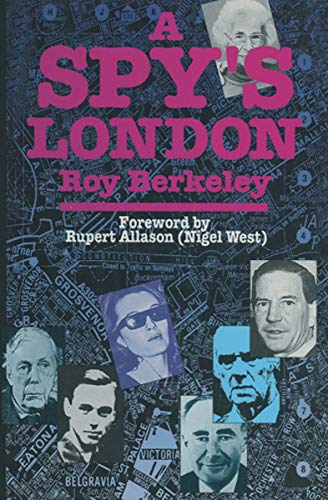 Roy Berkeley's "A Spy's London" - Original U.S. Edition - A Few Unsold Copies Available
Roy Berkeley's "A Spy's London" - Original U.S. Edition - A Few Unsold Copies Available
In 'this remarkable book' (as intelligence historian and AFIO member Nigel West describes in his Foreword), the reader will be struck by the vibrancy of history made real. Author/AFIO member Roy Berkeley goes behind the facades of ordinary buildings, in the city that West calls 'the espionage capital of the World,' to remind us that the history of intelligence has often been made in such mundane places. With his evocative photographs and compelling observations, The 136 sites are organized into 21 manageable walks. But also a joy to armchair travelers. Among the sites: the modest hotel suite where an eager Red Army colonel poured out his secrets to a team of British and American intelligence officers; the royal residence where one of the most slippery Soviet moles was at home for years; the London home where an MP plotting to appease Hitler was arrested on his front steps in 1940. A few copies are available at only $20 a copy (postage to a U.S.-based address included). Telephone the office at 703-790-0320 or email julie@afio.com to obtain one of these last copies.
CIA's In-house Gift Shop

One special benefit of AFIO membership is access to CIA's EAA Store.
After completing the required, quick pre-approval process for all AFIO members described here, you can purchase directly from the EAA online store their unusual logo'd gift items for self or colleagues. EAA on 20 October 2023 released the photo above, which features some of their newest CIA items and other gift suggestions.
Section I - CURRENT INTELLIGENCE NEWS HIGHLIGHTS
Official NORAD Santa Tracker - NORAD, 19 Dec 23
24 hours a day, 365 days a year, NORAD tracks everything that flies in and around North America in defense of our homelands. On Dec. 24, we have the very special mission of also tracking Santa. NORAD has been tracking Santa since 1955 when a young child accidentally dialed the unlisted phone number of the Continental Air Defense Command (CONAD) Operations Center in Colorado Springs, Colorado, believing she was calling Santa Claus after seeing a promotion in a local newspaper. Air Force Colonel Harry Shoup, the commander on duty that night, was quick to realize a mistake had been made, and assured the youngster that CONAD would guarantee Santa a safe journey from the North Pole. Thus a tradition was born that rolled over to NORAD when it was formed in 1958. Each year since, NORAD has dutifully reported Santa's location on Dec. 24 to millions across the globe. (Access tracker here.)
GCHQ Christmas challenge: Agency reveals 2023 codebreaker - BBC, 13 Dec 23
What do gift tags, candy canes and several layers of hardened code have in common? They are all elements of an annual brainteaser for UK school children set by the nation's spy agency. Ensuring sharp minds do not fall idle as the winter break approaches, GCHQ has released its code-breaking challenge, aimed at 11 to 18-year-olds. More than 1,000 secondary schools signed up for the 2023 event, which this year features some of the trickiest puzzles yet. This is the third edition of the challenge, which is designed around a Christmas card sent by Anne Keast-Butler, the director of the Cheltenham-based intelligence agency. (Full article here.)
DIA to release new AI strategy - Federal News Network, 13 Dec 23
The Defense Intelligence Agency is finalizing its artificial intelligence strategy to control the use of technology for decision support and human-machine teaming when providing intelligence to warfighters and policymakers. Ramesh Menon, DIA’s chief technology officer and new chief artificial intelligence officer, established the AI strategy, which is expected to be announced this week. “When we create any strategy, it’s about truly understanding from a stakeholder perspective what is required? What are the gaps? Once you have a strategy, then you have to operate like the strategy. How do you do that? How do you create underlying for structure, the organizational design processes? Technology is changing at a very rapid pace,” Menon said during an interview for Federal Monthly Insights – AI/ML Systems. “We really are trying to figure out the best scenario for decisions support, decision augmentation and decision automation for human and machine teaming. And that will take a while and the underlying governance structure for it.” To have a clear vision in creating the AI strategy, DIA assembled five pillars creating new capabilities, identifying gaps and highlighting where they’re having the most success in the agency using AI. The pillars consist of platforms, skills, tradecraft, mission priorities and partnerships. DIA is also looking at experimentation as part of how they want to bring the younger generation into the workforce so they can add into new capabilities. (Full article here.)
How Russian intelligence services have taken over Wagner's operations in Africa - Le Monde, 12 Dec 23
Since the dissolution of the Wagner mercenary group, Russia has restructured its paramilitary networks in Africa, particularly in the Central African Republic (CAR), which in recent years has become a hub for Russian security services on the continent. Now under state control, Russia-Africa networks have become more official and the careers of their leaders are easier to identify as most of them come from the Russian Ministry of Defense or the Foreign Intelligence Service (SVR). That's according to the joint investigation published on Thursday, December 7, by the independent website All Eyes on Wagner (AEOW) associated with Radio Liberty – a media outlet funded by the US Congress – which revealed the names and photographs of some of the key Russian officials responsible for coordinating Russia's actions in Mali, Burkina Faso and CAR. (Full article here.)
NGA plans ‘significant’ awards for commercial data services - Federal News Network, 13 Dec 23
The National Geospatial-Intelligence Agency is continuing its push to take advantage of unclassified commercial data sources, with plans to launch a competition for commercial GEOINT data services next month. Vice Adm. Frank Whitworth, director of NGA, said the agency will release a request for proposals for the “Luno A” program in January. NGA plans to make awards to multiple vendors. The contracts will help NGA acquire commercial GEOINT object detections, and leverage industry analytics and automation. “I wish I could tell you the amount, but let’s just say it’s significant,” Whitworth said Tuesday during the Defense Department Intelligence Information System (DoDIIS) conference in Portland, Ore. NGA released a draft RFP for the Luno A contracts this fall. The goal of the effort is to “transform” NGA’s approach to geospatial information, while expanding access to both data and services. (Full article here.)
China's Spies Offered $15 Million for Taiwan Army's US Chinook Helicopter - Newsweek, 12 Dec 23
Counterintelligence agents in Taiwan thwarted a high-profile defection from the island's armed forces after Chinese spies enticed a Taiwanese army pilot to hand over a U.S.-made CH-47 Chinook helicopter in exchange for $15 million, a local magazine reported on Monday. The lieutenant colonel surnamed Hsieh was offered money, and safe passage for him and his family in the event of a conflict with China, if he could land the helicopter on the deck of a Chinese navy aircraft carrier, which would be passing the island's coastline, according to Chinese-language outlet CTWant. Taiwan's Defense Ministry declined to comment on the report's details but in a statement later on Monday, said an investigation, following an "internal tip-off," led to the officer's arrest and prosecution in Kaohsiung, a southern port city, at an undisclosed date this year. (Full article here.)
In-Q-Tel Opens First APAC Office in Singapore to Invest in Deeptech Startups - Deal Street Asia, 14 Dec 23
In-Q-Tel (IQT) - a non-profit organisation aimed at bridging security needs of the US and its allies - has opened its first Asia-Pacific office in Singapore. The American corporate venture firm has a portfolio of over 700 companies across the US, Europe, and Australia, focuses on early-stage deep-tech companies. Some of its well-known portfolio firms include Palantir, Rigetti Computing, GitLab, DataBricks, and Keyhole (acquired in 2003 by Google to form Google Maps). Its latest foray into Singapore signals the emerging maturity of Asia's deeptech ecosystem as well as the rising importance of the Southeast Asian city-state to US strategic interests. IQT was founded in 1999 by the CIA and various US government agencies to stay abreast of cutting-edge innovation coming out of Silicon Valley. Its goal as a strategic investor is to identify and nurture solutions which will support the national security mission of the US and its allies. (Full article here.)
Czech counterintelligence identifies Russia and China as the nation’s greatest threats - Expats CZ, 12 Dec 23
At a security conference in Prague this afternoon, head of the BIS Czech counterintelligence service Michal Koudelka said that Russia and China continue to be the main drivers of disinformation nationwide. The BIS labels Russia as the biggest threat, due to Czechia’s staunch support of Ukraine. According to Koudelka, Russia focuses on anti-Czech-government propaganda and criticizes the Czech cabinet’s support of Ukraine. China has also done the same, but to a much lesser extent – the country aims to destabilize the political order in Czechia. "Our efforts to counter this pressure have intensified," Koudelka noted. The BIS chief also told journalists that the current Czech disinformation sphere was “spontaneous” and “fragmented.” According to the BIS, the main dangers of disinformation manifest themselves in large-scale demonstrations, of which there have been many that were against the government in Prague this year. (Full article here.)
House Approves Four-Month Extension Of Feds’ Warrantless Spying On Americans - The Federalist, 15 Dec 23
House lawmakers permitted a four-month extension of warrantless surveillance through the National Defense Authorization Act (NDAA) on Thursday. The lower chamber voted 310-118 to pass the annual national-defense bill after the Senate approved the legislation Wednesday. Slipped into the measure was a reauthorization of the federal government’s warrantless spying on American citizens known as Section 702 of the Foreign Intelligence Surveillance Act (FISA). The 2008 law allows federal intelligence agencies to conduct warrantless surveillance that’s ostensibly limited to foreign nationals but has been routinely abused to surveil American citizens. The controversial law will now bypass significant reform for another four months through the NDAA. (Full article here.)
Spy agency set to transfer counterespionage authority to police, but doubts remain - Korea JoongAng Daily, 12 Dec 23
The National Intelligence Service (NIS) will transfer its counterespionage authority to the police on Jan. 1, according to an enforcement decree issued Tuesday. The decree was passed as part of the former Moon Jae-in administration’s initiative to transfer some of the intelligence agency's responsibilities to the national police. It stipulates that the intelligence agency will no longer conduct counterespionage investigations starting next year. The NIS officers can still assist police investigations, however, to the extent of sharing information and know-how to help the police fulfill their new role. “The fact that the government has enabled the National Intelligence Service access to criminal situations through an enforcement ordinance should help fill any gaps in expertise on the matter caused by the transfer of investigative authority next year,” said Nam Sung-wook, professor of political science at Korea University. “It will also be important to prepare the police for counterespionage investigations in third countries,” Nam said. Other experts have expressed doubts about the police's ability to investigate North Korean espionage attempts, partly due to the NIS’s years of experience in collecting intelligence using domestic and international networks, which cannot be transferred overnight. (Full article here.)
Canada's top spy reflects on his uneasy year in the spotlight - Canadian Broadcast Corporation, 16 Dec 23
The head of Canada's intelligence agency spent much of 2023 where spies don't like to be — in the spotlight, on the back foot. Canadian Security Intelligence Service Director David Vigneault spent the first half of the year fielding questions about whether CSIS responded properly to Chinese election interference. He's ending the year facing questions about whether security services could have prevented the death of Hardeep Singh Nijjar, the Sikh activist India is accused of killing outside a temple in Surrey, B.C. These questions cut directly to CSIS's reason for existing. So is Canada's leading intelligence agency still capable of keeping up with a bewildering range of threats both new and old? (Read more here.)
NDAA directs officials to establish ‘Intelligence Community Innovation Unit’ - Federal News Network, 15 Dec 23
Intelligence agencies are working on multiple initiatives and strategies to address artificial intelligence and other emerging technologies, but Congress is pressing the intelligence community to do more to adopt new capabilities. The fiscal 2024 national defense authorization act, passed by both chambers of Congress and expected to be signed by President Joe Biden, includes a provision directing the director of national intelligence to set up an “Intelligence Community Innovation Unit,” within the Office of the Director of National Intelligence. Similar to the Pentagon’s Defense Innovation Unit, the notional IC organization would be tasked with “identifying commercial emerging technologies and associated capabilities to address critical mission needs of elements of the intelligence community,” the bill states. The unit would provide intelligence agencies with technology expertise, while also working to transition promising prototype technologies into production. And lawmakers envision the unit as serving as a liaison between the intelligence community and the private sector, in particular small- and medium-sized businesses. (Read more here.)
The D.C. National Guard Starts Recruiting for Its First Military Intel Unit - Clearance Jobs, 18 Dec 23
The District of Columbia National Guard can trace its origins back to a time before there was even a district, and when militia units were first formed in Georgetown and Baldensburg. After the American Revolution, Congress officially recognized those and numerous militias of the United States, which in time became the National Guard. However, when it was decided that a new capital city was to be created, an issue came up as to which militia would actually protect it – as the city wasn’t in a state and therefore there was no governor. Thus in 1802, the D.C. National Guard was created with a national mission, to protect the Federal Government. It is also the only National Guard that reports only to the U.S. president. This month, as part of a strategic move to bolster the nation’s defense capabilities as well as to address emerging security challenges, the District of Columbia Army National Guard officially activated Delta Company, 223rd Military Intelligence Battalion (LING), during a ceremony at the D.C. Armory December 9. “Events like this do not happen every day. It is a rare occasion when a state, territory, or district activates a unit,” said Maj. Gen. John Andonie, commanding general of the D.C. National Guard. (Read more here.)
Counterespionage Corner - Recent Arrests, Convictions, Expulsions, and more...
- Iran says it has executed an Israeli Mossad spy - Associated Press, 15 Dec 23
- A fugitive Wirecard executive was likely a Russian agent for nearly a decade: report - Business Insider, 15 Dec 23
- Man working at Naval Dockyard held on espionage charges’ - The Week India, 13 Dec 23
- “José” turns Mikhail. GRU colonel admits being Russian national - The Barents Observer, 14 Dec 23
- Germany starts trial of alleged Russian spy - Deutsche Welle, 12 Dec 23
- British intelligence says Canada’s cyberspies are ‘at the head of the pack’ - The Globe and Mail, 12 Dec 23
- China's Secret War Preps Inside US Utilities - Spy Talk, 15 Dec 23
- Harry Coker confirmed to be the next National Cyber Director - Cyberscoop, 12 Dec 23
- Terrifying hacks on critical infrastructure have arrived. America isn’t ready. - The Hill, 12 Dec 23
- Russian Foreign Intelligence Service Exploiting Jetbrains Teamcity CVE Globally - NSA, 13 Dec 23
- Ukraine’s intelligence claims cyberattack on Russia’s state tax service - The Record, 12 Dec 23
- Federal cyber officials steel for Chinese threat to 2024 elections - Washington Times, 11 Dec 23
Section II - DEEP DIVES
(Research Papers, OpEds, Analysis, Podcasts)
(Research Papers, OpEds, Analysis, Podcasts)
China's Espionage Recruitment Motivations: Getting Rid of the M.I.C.E. - European Intelligence Academy, 12 Dec 23
For decades, English speaking intelligence services have routinely defined specific motivations for persons recruited to conduct espionage. Those motivations are reflected in the acronym MICE: Money, Ideology, Coercion, and Ego. This acronym is taught to intelligence operations officers, counterintelligence special agents, analysts, and insider threat specialists. However, the human intelligence (HUMINT) activities of the People’s Republic of China (PRC) are far more extensive then typically practiced by Western nations. The Communist Party of China (CPC) and PRC government employ a ‘whole of society’ approach towards collecting broad categories of commercial, scientific, and national security information. The result of this ‘whole of society’ approach is to add several dimensions of complexity to the motivational factors for people conducting espionage on behalf of the PRC.1 Not only are the personal motivations more varied and complex, but so too are the recruitment activities used to employ agents on China’s behalf. In error, some authors have identified China’s approach to recruiting HUMINT sources as Spot, Assess, Develop, and Recruit. This is a Western model and far more simplistic than the multiple models employed by Chinese government ministries, CPC elements, and businesses. (Full report here.)
Homeland Threat Assessment 2024 - DHS Office of Intelligence and Analysis, 12 Dec 23
Terrorism, both foreign and domestic, remains a top threat to the Homeland, but other threats are increasingly crowding the threat space. During the next year, we assess that the threat of violence from individuals radicalized in the United States will remain high, but largely unchanged, marked by lone offenders or small group attacks that occur with little warning. Foreign terrorist groups like al-Qa’ida and ISIS are seeking to rebuild overseas, and they maintain worldwide networks of supporters that could seek to target the Homeland. In addition to the enduring terrorism threat, we expect illegal drugs produced in Mexico and sold in the United States will continue to kill more Americans than any other threat. During the past year, US-based traffickers have become more involved in the mixing and pressing of fentanyl, contributing to more lethal mixes of this already deadly drug. This year, record encounters of migrants arriving from a growing number of countries have complicated border and immigration security. While monthly encounters have fallen from record highs in December, overall encounters for the fiscal year are on pace to nearly match 2022’s record high total. As part of the overall increase in migration, we have also encountered a growing number of individuals in the Terrorist Screening Data Set (TSDS), also known as the “watchlist.” Inclusion in the TSDS ranges from known associates of watchlisted individuals, such as family members, to individuals directly engaged in terrorist activity. (Full report here.)
Report of Investigation (S9691) [The Texiera Incident] - Unauthorized Disclosure of National Security Information - Inspector General of the Department of the Air Force, August 2023 (released to public 12 Dec 23)
SecAF directed this investigation in response to the unauthorized disclosure of classified information from the 102d Intelligence Wing (102 IW), Otis Air National Guard Base (ANGB), Massachusetts. SecAF directed The Inspector General of the Department of the Air Force (SAF/IG) to “investigate compliance with policy, procedures, and standards and the unit environment at the 102 IW related to the unauthorized disclosure of classified national security information.” While the precipitating event was centered on the 102 IW, the investigation included organizations and areas outside the 102 IW regarding security-related policies and procedures. Although related, this administrative investigation is separate from the criminal investigation currently being led by the Department of Justice (DOJ). On 13 Apr 23, Federal Bureau of Investigation (FBI) agents from the Boston Field Office arrested A1C Jack D. Teixeira, a Cyber Transport Systems Apprentice in the Massachusetts ANG (MAANG), on suspicion of willfully retaining and transmitting classified national defense information to a person not entitled to receive it via Discord, a social media platform. A1C Teixeira enlisted in the USAF on 26 Sep 19, and his Top Secret-Sensitive Compartmented Information (TS-SCI) background check was adjudicated on 29 Jun 21. On 1 Oct 21, he began the first of two consecutive in-place Title 10 (T10) tours. As a computer/IT specialist in the 102d Intelligence Support Squadron (102 ISS), A1C Teixeira had access to numerous classified systems, including the Joint Worldwide Intelligence Communication System (JWICS), a TS-SCI platform, to perform system maintenance. His access to JWICS enabled him to view intelligence content and analysis that reside on those systems. (Read full report here.)
U.S. Intelligence Sharing With Israel Deserves the Same Scrutiny as Arms Transfers - Lawfare, 14 Dec 23
Once a cornerstone of U.S. foreign policy, U.S. arms transfers to Israel are under the gun. As the civilian death toll in Gaza climbs, scrutiny over Israel’s weapons of U.S. origin has climbed with it. Israel is the largest historical recipient of U.S. security aid, having received roughly $3 billion on average for the past 50 years, and the Biden administration announced it would ask Congress for “an unprecedented support package for Israel’s defense,” totaling $14.3 billion following Hamas’s Oct. 7 attack on Israel. As long as bombs continue to fall on Gaza, and the Biden administration continues to sidestep legal and policy restrictions on arms sales to Israel, such scrutiny on weapons transfers makes sense. But another crucial aspect of U.S. security assistance to Israel—intelligence sharing—has continued largely without the same scrutiny, despite its significance to Israel’s ability to wage war. For anyone concerned with the humanitarian catastrophe unfolding in Gaza, it’s important to look not only at the bombs but also at the intelligence that helps Israel direct where the bombs are headed. U.S.-Israel intelligence sharing could “raise heightened concerns” compared to arms transfers, Brian Finucane, senior adviser in the U.S. program at the International Crisis Group, told me. “It’s one thing to provide arms that can be used for a variety of purposes and a variety of targets,” he continued. “But if you’re providing actionable intelligence on a specific individual, and that individual happens to be civilian? That is much more ripe for potential abuse, and the nexus between U.S. support and potential law of war violations is much tighter.” (Read full report here.)
Requirements and Priorities: an under-examined mechanism - Brunel Centre for Intelligence and Security Studies, 13 Dec 23
Literature on intelligence tends to acknowledge the requirements and priorities (R&P) process in passing, but rarely is explored in depth— at best, it is granted a few pages in larger volumes. However, this mechanism, which exists at the nexus of the intelligence and policy communities, has a significant impact on national security outcomes. My most recent article, “Modelling the intelligence requirements and priorities process: the US response to the Rwandan genocide”, explores the role of the R&P process in developing the mandate for the US intelligence community, and demonstrates the positive and negative impacts that this mechanism can have on urgent escalation of priorities; in this case, the Rwandan genocide of 1994. The R&P helps to determine national security priorities and the related distribution of resources across the intelligence community. It provides guidance for collaborative efforts between various departments or agencies, and issues authorisations regarding what can and cannot be done in the efforts to collect information on a particular topic. Surely, such a significant process should be considered more deeply. In the case of the Rwandan Genocide, we are given a window into both the success and failure of a mandate when urgent issues arise. On one hand, the R&P process worked smoothly to execute the rapid evacuation of US expats from Rwanda at the start of the genocide on 6 April 1994. On the other hand, the process failed to address the larger issue of the genocide itself—resulting in not only in the loss of countless lives, but also costing the US nearly eight times the amount they would have spent had they responded earlier. (Read full report here.)
Beyond the SCIF: Countering Chinese Influence Operations on American Soil - Hudson Institute, 12 Dec 23
Representative Mike Waltz (FL-6), a member of the House Permanent Select Committee on Intelligence (HPSCI), will moderate a panel on China’s influence operations in the United States with Hudson Senior Fellows John Lee and Miles Yu and Foundation for Defense of Democracies Senior Fellow Craig Singleton as part of the committee’s Beyond the SCIF series. HPSCI Chairman Mike Turner (OH-10) and Hudson President and CEO John Walters will deliver opening remarks. The panelists will discuss the scope of the Chinese Communist Party’s influence campaign and examine opportunities for the US and its allies to counter Beijing’s espionage and malign influence. How should Washington respond to Chinese influencers seeking to shape public opinion and manipulate American officials and business leaders into enacting Beijing’s policy preferences? How do the influence operations that China aims at the US differ from those it directs at our allies? Should Washington retaliate by amplifying the voices of Chinese dissidents as it did with dissidents in the Soviet Union? (Watch here.)
AI Is Replacing 007 in the Espionage Arms Race: A conversation with Harvard’s Calder Walton - Bloomberg, 15 Dec 23
Folks who think about such things tend to look at the great espionage battle between the US and the Soviet Union as covering the four decades of the Cold War — the heady days of the Rosenbergs, the Wall, the Cuban Missiles and the owlish George Smiley. But in truth, as Calder Walton reminds us in his remarkable new book Spies: The Epic Intelligence War Between East and West, a struggle that began after the Russian Revolution in 1917 is with us to this day. Walton obsessively and entertainingly documents this century of the clandestine warfare, and reminds us that this contest didn’t waver during the brief enemy-of-my-enemy Alliance during World War II or in the immediate aftermath of the Soviet collapse, a period “Slow Horses” author Mick Herron memorably calls “the blissful break when the world seemed a safer place, between the end of the Cold War and about ten minutes later.” (Read full report here.)
Shifting Sands of Intelligence: Israel's Aman and Shin Bet in the Maze of Security, Strategy, and Statecraft - Real Clear Defense, 12 Dec 23
Intelligence plays a crucial role in mitigating uncertainty, risk, and the likelihood of failure in intricate scenarios, although it does come with certain limitations. The distinct historical backdrop of Israel, particularly shaped by its formation following the 1948 war, has significantly influenced the evolution of its intelligence community. This includes the dynamics and interactions among the different agencies within this community. In Israel, the military significantly influences national security and defense policies. This approach originated from a strategic decision by David Ben Gurion, the nation's first Prime Minister. Ben Gurion aimed to separate security matters from party politics to shield them from political interference. Consequently, security decision-making became centralized, primarily involving Ben Gurion, his trusted military advisors, and commanders who shared his political views. (Read full report here.)
Intelligence liaison under scrutiny, part I: Cyprus sigint - Tom Griffn on Intelligence History, 14 Dec 23
As the Gaza conflict drags into its third month, questions have only grown about the role of intelligence; whether in creating the conditions for the war, in fuelling the fighting, or in the so far abortive attempts to end it. In the immediate aftermath of 7 October, British Prime Minister Rishi Sunak told his Israeli counterpart, Benjamin Netanyahu, that the UK was prepared to provide ‘diplomatic, intelligence, or security support.’ Poseidon P-8 surveillance aircraft formed part of the military package dispatched to the region in the following days. As the Israeli response has over-shadowed the original Hamas attacks, the British Government account of its role has become more circumspect. After briefings from current and former GCHQ and MI6 officers, the i reported on 13 October that British intelligence agencies were aiding the search for hostages taken by Hamas and other militias, a mission that could be hampered by the breakdown of the electricity network inside Gaza. (Read full report here.)
Who is watching Britain’s spies? - The Spectator, 11 Dec 23
Parliament’s intelligence watchdog is muzzled, neutered and sick.The Intelligence and Security committee, which oversees the UK intelligence community – MI5, MI6, GCHQ etc – released its annual report this week, and it makes for a sad read. The committee says it is ‘concerned’, ‘perplexed’ and ‘disappointed’ with the government. At one point it is ‘deeply disappointed and concerned.’ The government is deliberately obstructing the committee’s work, it says. The ISC’s most serious complaint is that the government is refusing to let them oversee the whole scope of the Britain’s intelligence community. Intelligence and security activities are increasingly devolved to units within Whitehall departments. They might involve transport security or telecoms security, rather than activities more often associated with MI5 or MI6. The ISC, as the only committee with the necessary clearances, thinks its remit should cover these units. It was therefore ‘taken aback’ – committee speak for apoplectic – to be denied oversight of the Investment Security Unit, which draws on secret intelligence to advise on national security risks to the UK from foreign investments or acquisitions. (Read full report here.)
National Intelligence Centre: Spain’s Intelligence Service - Grey Dynamics, 15 Dec 23
The National Intelligence Centre (in Spanish: Centro Nacional de Inteligencia or CNI), known colloquially as “La Casa” (The House), is Spain’s main foreign and domestic intelligence service. CNI was created in 2002 as the successor to the Centro Superior de Información de la Defensa (CESID), Spain’s prior intelligence agency. The CNI is integrated into the Ministry of Defence as a public body with functional autonomy. It has legal personhood and full capacity to act. CNI is also a “top advisor” to the Spanish Government in matters of national security and intelligence. The CNI collaborates with Spain’s other intelligence agencies, including the Armed Forces Intelligence Centre (military intelligence) and the Intelligence Center for Counter-Terrorism and Organized Crime (Ministry of the Interior). It also collaborates with foreign intelligence counterparts to address transnational threats and contribute to global security efforts. This includes working with the EU Intelligence and Situation Centre (EU INTCEN). In this article, we analyse the history, functions, structure and key operations of the CNI. (Read full report here.)
Why US is touching the RAW nerve - The Tribune, 18 Dec 23
In the alleged plot to assassinate Khalistani terrorist Gurpatwant Singh Pannun, officials in India found a startling similarity with an alleged attempt to kill an anti-Iran journalist. In both killings that were to take place in New York but were thwarted by US intelligence agencies, the cutouts who allegedly received the targeting information from the Indian and Iranian governments were arrested in the Czech Republic. “The Czech authorities arrested and detained (Nikhil) Gupta on June 30, 2023, pursuant to the bilateral extradition treaty between the US and the Czech Republic,” reads the US Department of Justice (DoJ) press release on the case that has rocked India-US ties. Six months earlier, the US DoJ said Polad Omarov, who was allegedly passing on the targeting information from the Iranian government to kill an Iranian-origin journalist in New York, was also arrested in the Czech Republic on January 4, 2023. The Czech connection regularly props up in the US DoJ filings. Suspects wanted in the US for attempted assassinations to wire frauds to child pornography happen to be hauled in by the Czech authorities for quick extradition to the US. (Read full report here.)
The Latest from International Spy Museum Historian Andrew Hammond, PhD.
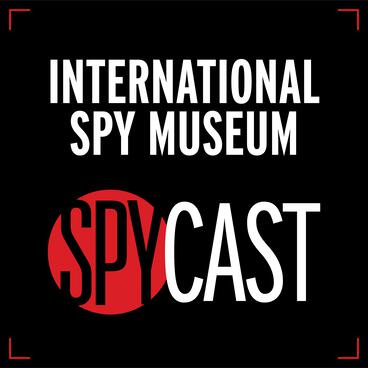 Spycast is the official podcast of the International Spy Museum and hosts interviews with intelligence experts on matters of HUMINT, SIGINT, IMINT, OSINT, and GEOINT. Spycast is hosted by historian Andrew Hammond, PhD.
Spycast is the official podcast of the International Spy Museum and hosts interviews with intelligence experts on matters of HUMINT, SIGINT, IMINT, OSINT, and GEOINT. Spycast is hosted by historian Andrew Hammond, PhD.
12 Dec | “My Life in American Intelligence” – with Barry Zulauf Barry Zulauf joins Andrew Hammond to discuss his extensive experience working across the American intelligence community. Barry is the President of the International Association for Intelligence Education.
Section III - FORMERS' FORUM
(Legacy Intel Practitioners' Informed Perspectives)
(Legacy Intel Practitioners' Informed Perspectives)
The Latest Insights from Former CIA Acting Deputy Director for Operations Jack Devine.
 In Other News The proprietary analytic newsletter crafted for The Arkin Group's private clients by former CIA Acting Deputy Director for Operations Jack Devine.
In Other News The proprietary analytic newsletter crafted for The Arkin Group's private clients by former CIA Acting Deputy Director for Operations Jack Devine.
14 Dec | Putin’s propaganda machine was in full force during his annual press conference, but inflation emerged as a key concern among the crowd. And the West should maintain the pressure. This week, in an event that lasted over four hours, the Russian President delivered his annual press conference and fielded questions in a “Direct Line” question-and-answer session. While the overall takeaway was that Putin has no intention of ending the war on Ukraine, and instead plans to continue indoctrinating his nation’s youth to support his narrative, questions regarding the prices of Russian goods were peppered throughout the session. Participants asked about the high cost of everything from chicken meat and eggs, to auto and aviation parts. (Full version available to AFIO members in the coming days here.)
Daily Analysis of Security Issues and Geopolitical Trends
 Intel Brief The Soufan Center's flagship, daily analytical product focused on complex security issues and geopolitical trends that may shape regional or international affairs. The Soufan Center was founded by former FBI Special Agent and Soufan Group CEO Ali Soufan.
Intel Brief The Soufan Center's flagship, daily analytical product focused on complex security issues and geopolitical trends that may shape regional or international affairs. The Soufan Center was founded by former FBI Special Agent and Soufan Group CEO Ali Soufan.
19 Dec | Major Powers Struggle to Deter Houthi Shipping Attacks
The Houthi movement has progressively escalated its involvement in the Israel-Hamas war, even amid its unresolved conflict with the Saudi and United Arab Emirates (UAE)-backed Republic of Yemen government. While acting at the behest of their sponsor in Tehran, the Houthis are also appealing to deep pro-Palestinian sentiment among the Yemeni population. The group is the most active and aggressive faction among Iran’s “axis of resistance” coalition of non-state actors in retaliating against Israel and its main international supporter, the United States. By threatening freedom of commerce through a key chokepoint, the Bab El-Mandeb Strait at the south of the Red Sea, the Houthis are also creating an array of powerful new enemies – particularly the United States and its European allies. These powers have the potential to assist the Houthis’ domestic opponents, the Saudi and Emirati-backed Republic of Yemen Government. Earlier this month, the group expanded its target selection beyond Israeli-linked ships by threatening to attack any ship heading toward Israeli ports unless Israel allows food and medicine to enter the Gaza Strip.
18 Dec | Border Dispute between Venezuela and Guyana Continues to Simmer
15 Dec | Tensions Between Transparency & Security in Biden’s Executive Order on Artificial Intelligence
14 Dec | Will Sudan’s Latest Ceasefire Endure?
13 Dec | The Sahel Continues to Burn as the World Focuses Elsewhere
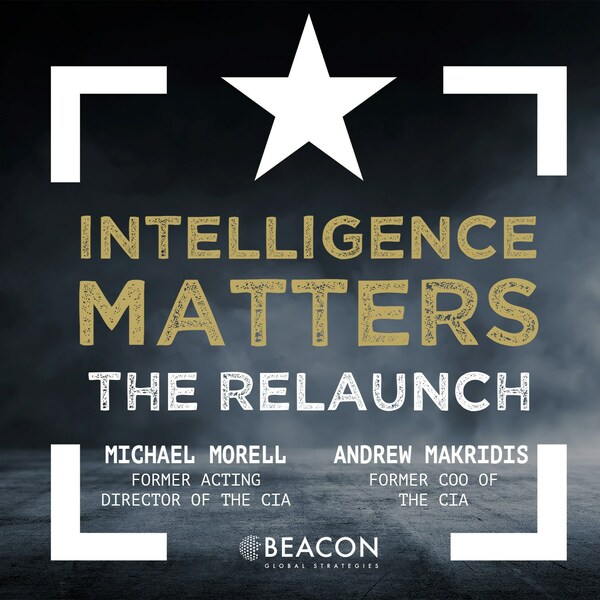 Intelligence Matters: The Relaunch is a Beacon Global Strategies podcast.
Intelligence Matters: The Relaunch is a Beacon Global Strategies podcast.
12 Dec | Advising the President: Former National Security Advisors Tom Donilon and Steve Hadley Michael speaks to two former White House National Security Advisors: Tom Donilon and Steve Hadley. They discuss the NSC advisory process, the Israel-Gaza War, China and Russia, and 21st century challenges to intelligence and national security.
Trump’s Stated Goals for the U.S. Intelligence Community: Assessing the Impact by former FBI Special Agent for Counterintelligence Asha Rangappa and former CIA Executive Marc Polymeropoulos - Just Security, 18 Dec 23
The phrase “failure of imagination” is often associated with the 9/11 Commission report. The term was used to describe why the U.S. intelligence community did not anticipate and prevent the historic attack on the country. We would be wise to remember this admonition as we look ahead to the potential for a future Trump presidency, especially in light of recent reporting detailing his plan to revamp – and, in fact, deeply politicize – the federal government. Quite remarkably, Trump is not hiding his intentions. He and his surrogates are saying quite clearly that their desire is to purge the government of those not sufficiently politically loyal to Trump. We ignore these stated goals at our peril. As unrealistic as it may seem that he will bring them to fruition, it is worth considering their potential consequences if he succeeds. Indeed, given his outspoken plans, he would likely try converting them into a “mandate” were he to win the presidency. The future scenario can and must be imagined. During our careers in national security, we each took an oath during the first day on the job. We proudly pledged fidelity to the U.S. Constitution, not to any man or woman. We pledged to support and defend the Constitution against all enemies, foreign and domestic. We cannot stress the importance of taking such an oath and how moving it was for us personally. We dedicated our lives to a cause far greater than ourselves. The pride we felt in working for the American people was profound. Duty, honor, country were our paramount values, all devoid of politics. We certainly never made decisions thinking we were serving under the watchful eye of any political leader sitting in the White House. We focus here on the threat to the U.S. intelligence community and intelligence capabilities in a second Trump administration. (Read more here.)
What the CIA can teach us about caring for one another by former CIA Chief of Station Daniel N. Hoffman - Higher Ground Times, 14 Dec 23
A few years back, when I was serving as station chief in a South Asian war zone, my CIA colleague Sean visited our town house late one evening to drop off a present for my older son, who was celebrating his fifth birthday. Sean surprised my wife, Kim, who was caring for our two young children while I was overseas serving an unaccompanied assignment. Sean gave my son a toy helicopter and told him how much his dad wished he could have been with him on his birthday were it not for the important work he was doing for our country with his colleagues overseas. Kim was deeply touched. Sean had already put in a busy day at work and took a detour before going home to his own family so that he could do something special for mine. A senior intelligence officer who has since retired, Sean did not tell me beforehand of his plan. His selfless and munificent gesture warmed my heart thousands of miles away. What mattered most to me and the colleagues with whom I had the honor of serving was that life was going on back home as it should. (Read more here.)
Initial Lessons from the Rocha Case: The United States Must Remain Alert for Foreign Intelligence Threats by former Acting Dep. Chief of the DOJ's National Security Division David Aaron - Just Security, 14 Dec 23
The allegations against Victor Manuel Rocha, a former U.S. ambassador to Bolivia and alleged Cuban agent, read like a Cold War spy novel. Federal prosecutors accuse Rocha of serving as a covert operative of Cuba, “an authoritarian, Communist state,” during a multi-decade career that provided Rocha with access to the nation’s closely guarded secrets and the opportunity to influence senior decision-makers. The case highlights the persistence of foreign intelligence services in general, and Cuba in particular, as threats to U.S. national security. It should be an interesting case to follow based on the specific charges, the conduct alleged, and the counterintelligence background and implications of the case. (Read more here.)
Deterrence and Dissuasion in the Taiwan Strait by Lonnie Henley, former Defense Intelligence Officer for East Asia, Senior Defense Intelligence Analyst for China, and National Intelligence Collection Officer for East Asia - Foreign Policy Research Institute, 12 Dec 23
Discussions of how to prevent a war over Taiwan tend to center on strengthening deterrence and convincing Beijing that it cannot conquer Taiwan at an acceptable cost. The underlying concern seems to be that China’s growing military and economic power will make an attack on Taiwan both feasible and attractive, that deterrence is waning, and therefore, may fail. I disagree. Deterrence remains strong, but deterrence alone is not sufficient to prevent conflict in the Taiwan Strait. If Chinese leaders come to believe that war is the only possible route to unification, they will attack despite military uncertainty and political and economic costs. A successful US strategy to avoid that outcome must pair deterrence with dissuasion, fostering Beijing’s belief that non-military paths to unification remain viable. There is a large and well-developed literature on deterrence theory, but the fundamentals have not changed since the late 1950s. One deters an adversary from a course of action by convincing him that the action cannot succeed (deterrence by denial) or that the costs far outweigh any possible benefits (deterrence by punishment). (Full report here.)
More Than 30 Americans Died on October 7 — Where Is the Outrage? by former CIA Executive Marc Polymeropoulos - The Messenger, 14 Dec 23
In my old world, running counterterrorism operations for the U.S. government, we lived by a simple motto: “Never forget.” When Americans were killed in terrorist attacks, there was no statute of limitations on our attempts to bring the perpetrators to justice. Whether by law enforcement means, if capture was feasible, or a kinetic operation under the U.S. military or even unique intelligence community authority, the full might of the U.S. government’s counterterrorism capabilities would be energized any time an American died at the hands of a terrorist. In essentially lawless areas of Pakistan and Yemen, for example, no member of any terrorist group who harmed Americans would be free of our reach. I recall the night we avenged the death of two intelligence officers who were killed. I was on the ground, serving in Afghanistan, and there was no prouder feeling that we brought some closure to grieving families and protected American military members who were still being targeted. We never forget our fallen. (Full report here.)
Section IV - MEMBER CONTRIBUTIONS
(All Categories)
(All Categories)
Article: Intelligence Researchers To Study Computer Code for Clues To Hackers' Identities - Wallstreet Journal via Slashdot, 15 Dec 23
The Intelligence Advanced Research Projects Activity, the lead federal research agency for the intelligence community, plans to develop technologies that could speed up investigations for identifying perpetrators of cyberattacks. "The number of attacks is increasing far more than the number of forensic experts that are available to go after these attacks," said Kristopher Reese, who is managing the research program at IARPA and holds a doctorate in computer science and engineering. The lack of forensic resources means hackers who target small organizations or companies that don't fall under critical infrastructure sectors often escape identification, he said. (Read full report here.)
Article: Ex-FBI counterintelligence official gets over 4 years in prison for aiding Russian oligarch - Politico, 14 Dec 23
A former top FBI counterintelligence official was ordered Thursday to spend over four years in prison for violating sanctions on Russia by going to work for a Russian oligarch seeking dirt on a wealthy rival after he finished his government career. Charles McGonigal was sentenced to four years and two months in prison in Manhattan federal court by Judge Jennifer H. Rearden, who said McGonigal harmed national security by repeatedly flouting sanctions meant to put economic pressure on Russia to get results without military force. He was also fined $40,000. (Read full report here.)
Article: Scoop: Israel's Mossad chief met Qatari PM to resume hostage talks - Axios, 16 Dec 23
Israel's Mossad spy agency director David Barnea met with Qatari Prime Minister Mohammed bin Abdulrahman Al Thani on Friday night in Europe to discuss resuming negotiations to secure the release of hostages held by Hamas in Gaza, according to two sources familiar with the meeting. Why it matters: It was the first meeting between senior Israeli and Qatari officials since the collapse of the seven-day ceasefire that led to the expansion of the Israeli military operation to southern Gaza. One source said the talks are "just a beginning" and stressed the process is going to be "long, difficult and complicated." CIA director Bill Burns and Egyptian intelligence chief Abbas Kamel were briefed on the meeting and are helping in the renewed push for a hostage deal, the sources added. The previous deal was derailed two weeks ago after Hamas refused to release the remaining women it is holding hostage. Hamas blamed Israel for the collapse and said the women Israel proposed be released were IDF soldiers. (Read full report here.)
Article: Chinese spies recruited European politician in operation to divide west - Financial Times, 15 Dec 23
Chinese spies ran a far-right Belgian politician as an intelligence asset for more than three years in a case that shows how Beijing has conducted influence operations in an effort to shape politics in its favour. Daniel Woo, an officer in China’s Ministry of State Security spy agency, pushed Frank Creyelman, a former Belgian senator, to influence discussions in Europe on issues ranging from China’s crackdown on democracy in Hong Kong to its persecution of Uyghurs in Xinjiang. As German Chancellor Olaf Scholz was about to visit China in late 2022, Woo asked Creyelman to convince two rightwing members of the European parliament to say publicly that the US and UK were undermining European energy security. “Our purpose is to divide the US-European relationship,” Woo wrote in a text message to Creyelman. (Read more here.)
Article: Classified binder on Russian meddling went missing as Trump left office: Reports - The Hill, 15 Dec 23
A binder containing classified information related to Russian meddling in the 2016 election went missing as former President Trump left office, according to new reports. The binder contained U.S. and NATO-ally “raw intelligence” on Russia and Russian agents, CNN first reported. The binder was last spotted at the White House during the former president’s final days in office and reportedly hasn’t been seen since. The “Crossfire Hurricane” binder has sparked concern about the possible spread of sensitive information, The New York Times reported. The binder’s name mirrors that of the FBI’s investigation into alleged connections between the 2016 Trump campaign and Russia. The information in the binder, described as being 10 inches thick, was so sensitive that even lawmakers and congressional aides with top secret security clearances could only go over the material at the CIA headquarters in McLean, Va., CNN reported. (Read full report here.)
Article: MI6 Chief Thanks Russian State Television for Its 'Help' in Encouraging Russians to Spy for the UK - Military.com, 12 Nov 23
The head of Britain’s foreign intelligence agency has thanked Russian state television for its “help” encouraging Russians to spy for the U.K. after it translated and broadcast part of a speech he gave earlier this year in which he called on Russians to “join hands with us.” Anchor Maria Butina — herself a former Russian spy — included the clip at the top of a program about Richard Moore, the head of Britain's Secret Intelligence Service, also known as MI6. Moore gave the speech in July at the British Embassy in Prague where he openly encouraged Russians faced with “the venality, infighting and sheer callous incompetence of their leaders” to spy for Britain. On Monday, Moore tweeted that the British foreign intelligence agency had been “puzzling over how to get my message to our target audience in Russia — we never thought Russian state TV would step in to help." “Thanks folks,” he added. (Read full report here.)
Article: At least 70 arrested in China Rocket Force Scandal - Asia Sentinel, 13 Dec 23
The Chinese government’s investigation of China’s Rocket Force, which includes the country’s long-range nuclear missiles capable of hitting the US, has netted at least 70 people. While corruption is one problem plaguing the rocket force, another motive for this widening investigation is suspicion that generals in the rocket force leaked China’s missile secrets to the US. When Chinese President Xi Jinping visited Russian President Vladimir Putin in March, Putin disclosed to Xi that former Chinese foreign minister Qin Gang played a role in the leak of China’s missile secrets to the US, Asia Sentinel learned from several sources. Qin was sacked as foreign minister on July 25, Asia Sentinel reported. He was last seen on June 25, while Lieutenant General Li Yuchao, then commander of China’s rocket force, was arrested around the same time, which strengthened suspicions that Qin was connected to the investigation of the rocket force, as Asia Sentinel reported on July 30. (Read full report here.)
Article: Exclusive: Leaked NSA Doc Reveals Massive Woke Glossary Pushing Critical Race Theory, Gender Ideology At Intel Agency - Daily Wire, 15 Nov 23
The National Security Agency, responsible for monitoring threats both foreign and domestic for the U.S. military, assumed a new responsibility under the Biden administration — creating a massive glossary of woke terms for employees, ranging from “anti-racist” to the gender-neutral pronouns “ze” and “zir.” A copy of the NSA’s Diversity, Equity, and Inclusion Glossary obtained and verified by The Daily Wire shows the agency now provides definitions for terms such as “queer theory” and “white fragility,” as part of its expansive guide to 327 social justice terms that blame “white Europeans” for engaging in “settler colonialism” and warn of “transmisogyny.” (Read full report here.)
Exhibit: Spies in the Skies: Second World War Aerial Reconnaissance - Imperial War Museums, U.K. 27 Dec 23 - 25 Feb 24
Spies in the Skies: Second World War Aerial Reconnaissance shines a spotlight on the squadrons tasked with flying behind enemy lines to gather intelligence from the air. The Photographic Reconnaissance Unit (PRU) would operate far behind enemy lines in specialised aircraft. They would often fly unarmed, with their weapons swapped for high-performance cameras. This winter, discover the incredible stories of the crew and aircraft who gathered crucial information from the war-torn skies of Europe. Learn the history of RAF aerial reconnaissance and get up close to the PRU's aircraft, gathered together under one roof. (Read more here.)
OpEd: What happened the day IU legend Bob Knight spoke to CIA senior officers - Indy Star, U.K. 14 Dec 23
It is hard to find anyone neutral about Bob Knight, the incredibly successful basketball coach who passed away in Bloomington on Nov. 1 at the age of 83. Love him or hate him it is impossible to argue that he was not one of the greatest basketball coaches of all time. While some in the public knew him as a patriot and lover of history, particularly military history, only a few knew he was also an ardent admirer of the CIA. I am one of those people. While in graduate school at Indiana, I met and got to know Knight through my thesis advisor, and we had stayed in touch for years. A few years later, in spring 1982, after joining the agency and while serving on my first domestic tour in the CIA, my boss at the time learned of my connection, and strongly encouraged me to invite Knight to address a group of newly-minted Senior Intelligence Service officers who were going to be visiting our city as part of a week-long training program. The officers were there to meet local government officials and CEOs of some of the largest corporations in the country, in part, to study leadership and management best practices. (Read more here.)
Article: He was taken hostage in Iran. Now, Thomas Ahern, ex-CIA spy, tells his story. - Washington Post, 17 Dec 23
The 91-year-old former CIA station chief in Tehran, seated in his living room in McLean, Va., glanced at his upturned palms. The bruises from his time as a hostage at the U.S. Embassy in Iran faded long ago. But memories of his captor pelting his hands with a rubber hose still flickered. For half an hour, his principal interrogator and others insisted that he confess that he was a CIA spy. “The most interesting part of that whole episode,” recalled ex-CIA officer Thomas Ahern, “is that he got a little impatient and forced me onto the floor on my back — no, on my stomach — because what they were preparing to do was work on my feet.” The former spy, dressed in khakis and black Crocs, grinned ruefully. Ahern (pronounced “Uh-HERN”) was one of dozens of Americans taken hostage at the embassy on Nov. 4, 1979, by Islamic radicals who were irate at U.S. support for Mohammad Reza Pahlavi, the self-exiled shah, and suspicious of the U.S. presence in their country. Ahern and 51 others would stay captive for 444 days before their release on Jan. 20, 1981, the last day of President Jimmy Carter’s administration and the first day of President Ronald Reagan’s. (Read more here.) (NOTE: Reading this article may require a free registration or a paid subscription.)
Article: A top-secret Chinese spy satellite just launched on a supersized rocket - Ars Technica, 15 Dec 23
China's largest rocket apparently wasn't big enough to launch the country's newest spy satellite, so engineers gave the rocket an upgrade. The Long March 5 launcher flew with a payload fairing some 20 feet (6.2 meters) taller than its usual nose cone when it took off on Friday with a Chinese military spy satellite. This made the Long March 5, with a height of some 200 feet, the tallest rocket China has ever flown. Adding to the intrigue, the Chinese government claimed the spacecraft aboard the Long March 5 rocket, named Yaogan-41, is a high-altitude optical remote sensing satellite. These types of surveillance satellites usually fly much closer to Earth to obtain the sharpest images possible of an adversary's military forces and strategically important sites. This could mean a few things. First, assuming China's official description is accurate, the satellite could be heading for a perch in geosynchronous orbit, a position that would afford any Earth-facing sensors continuous views of a third of the world's surface. In this orbit, the spacecraft would circle Earth once every 24 hours, synchronizing its movement with the planet's rotation. (Read more here.)
Section V - BOOKS, FILM, HISTORY, POP CULTURE
Books — Forthcoming, Newly Released, Overlooked
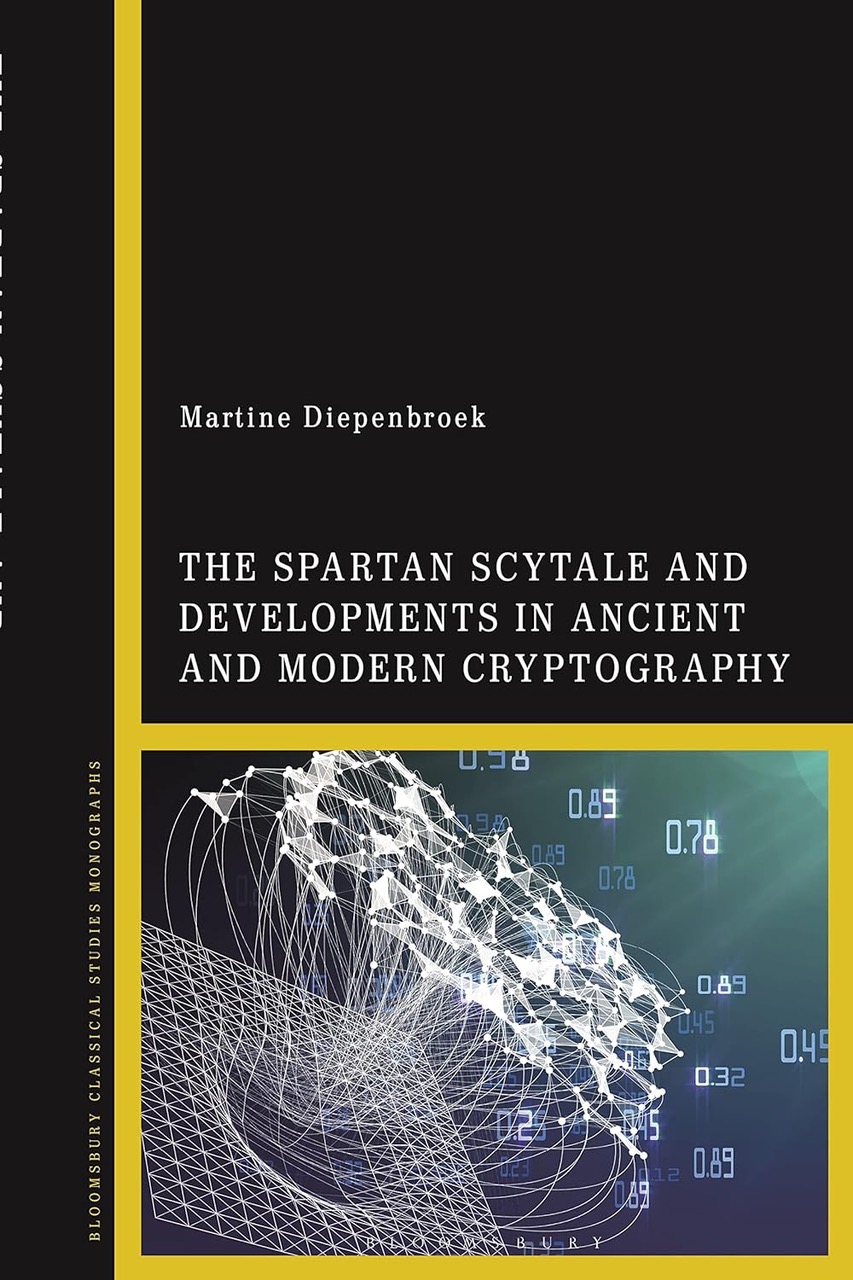 Spartan Scytale and Developments in Ancient and Modern Cryptography
Spartan Scytale and Developments in Ancient and Modern Cryptography
by Martine Diepenbroek
(Bloomsbury Academic, 14 Dec 23)
This book offers a comprehensive review and reassessment of the classical sources describing the cryptographic Spartan device known as the scytale. Challenging the view promoted by modern historians of cryptography which look at the scytale as a simple and impractical ‘stick’, Diepenbroek argues for the scytale’s deserved status as a vehicle for secret communication in the ancient world. By way of comparison, Diepenbroek demonstrates that the cryptographic principles employed in the Spartan scytale show an encryption and coding system that is no less complex than some 20th-century transposition ciphers. The result is that, contrary to the accepted point of view, scytale encryption is as complex and secure as other known ancient ciphers. Drawing on salient comparisons with a selection of modern transposition ciphers (and their historical predecessors), the reader is provided with a detailed overview and analysis of the surviving classical sources that similarly reveal the potential of the scytale as an actual cryptographic and steganographic tool in ancient Sparta in order to illustrate the relative sophistication of the Spartan scytale as a practical device for secret communication. This helps to establish the conceptual basis that the scytale would, in theory, have offered its ancient users a secure method for secret communication over long distances.
Order book here.
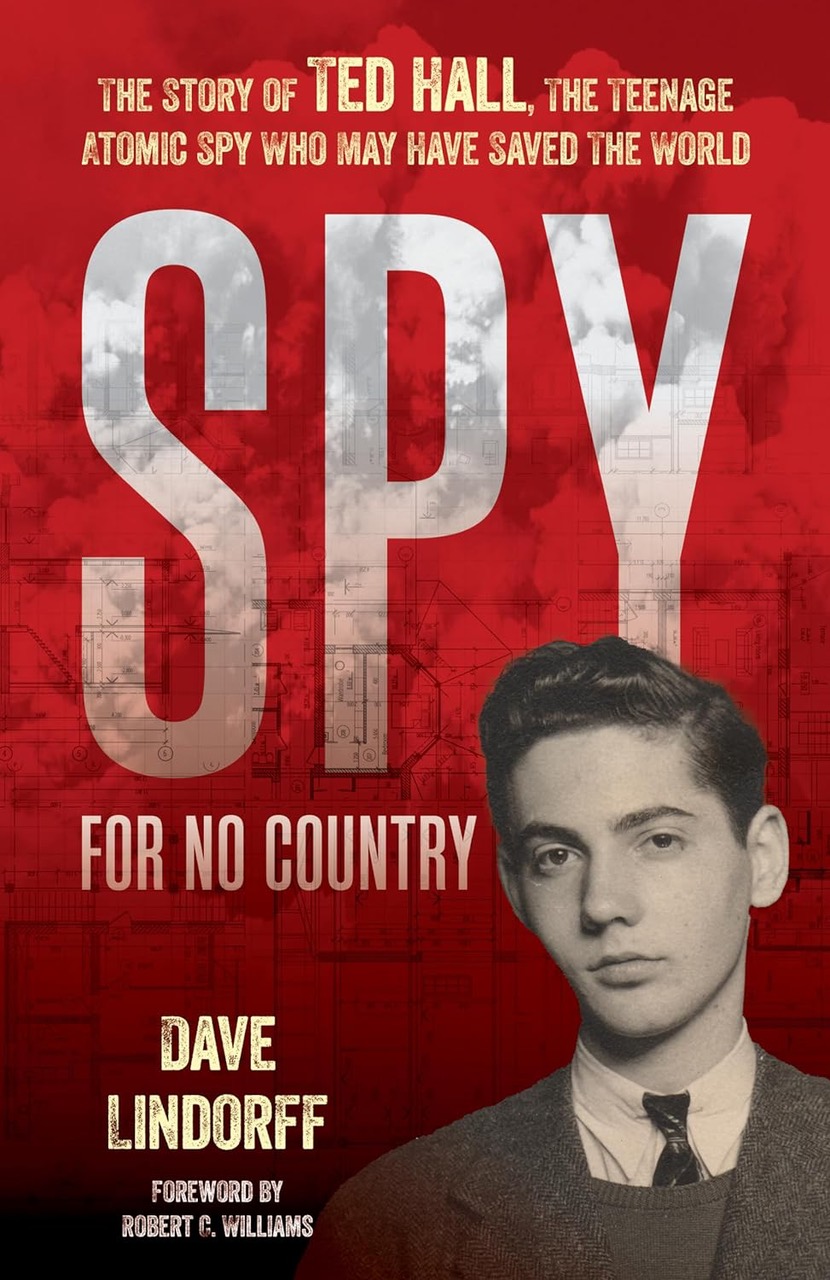 Spy for No Country: The Story of Ted Hall, the Teenage Atomic Spy Who May Have Saved the World
Spy for No Country: The Story of Ted Hall, the Teenage Atomic Spy Who May Have Saved the World
by Dave Lindorff
(Prometheus, 28 Nov 23)
At 18 years of age, Theodore Hall was the youngest physicist on the Manhattan Project, hired as a junior at Harvard and put to work at Los Alamos in 1944. Assigned the job of testing and refining the complex implosion system for the plutonium bomb, Hall was described as “amazingly brilliant” by his superiors on the project, many of whom were Nobel Prize winners. But what Hall’s colleagues didn’t know was that the teenaged Hall was also the youngest spy taken on by the Soviet Union in search of secrets to the atomic bomb. Spy for No Country tells the gripping story of a brilliant scientist whose information about the plutonium bomb, including detailed drawings and measurements, proved to be integral to the Soviet’s development of nuclear capabilities. In the dying days of World War II, defeat of the Third Reich became a matter of when, not if. Tensions between wartime allies America and the Soviet Union began to rise, and things only got hotter when the United States refused to share information on its nuclear program. This groundbreaking book paints a nuanced picture of a young man acting on what he thought was best for the world. Neither a Communist nor a Soviet sympathizer, Hall worked to ensure that America did not monopolize the science behind the atomic bomb, which he felt may have apocalyptic consequences. Instead, by providing the Soviets with the secrets of the bomb, and thereby initiating “mutual assured destruction,” Hall may have actually saved the world as we know it. But his contributions to the Soviets certainly did not go unnoticed. FBI Director J. Edgar Hoover opened an investigation into Hall, which was escalated when it was discovered that Hall’s brother Edward was a rising star of the Air Force, leading the development of intercontinental ballistic missiles. Featuring in-depth research from recently declassified FBI documents, first-hand journals, and personal interviews, investigative journalist Dave Lindorff uncovers the story of the atomic spy who gave secrets away, and got away with it, too.
Order book here.
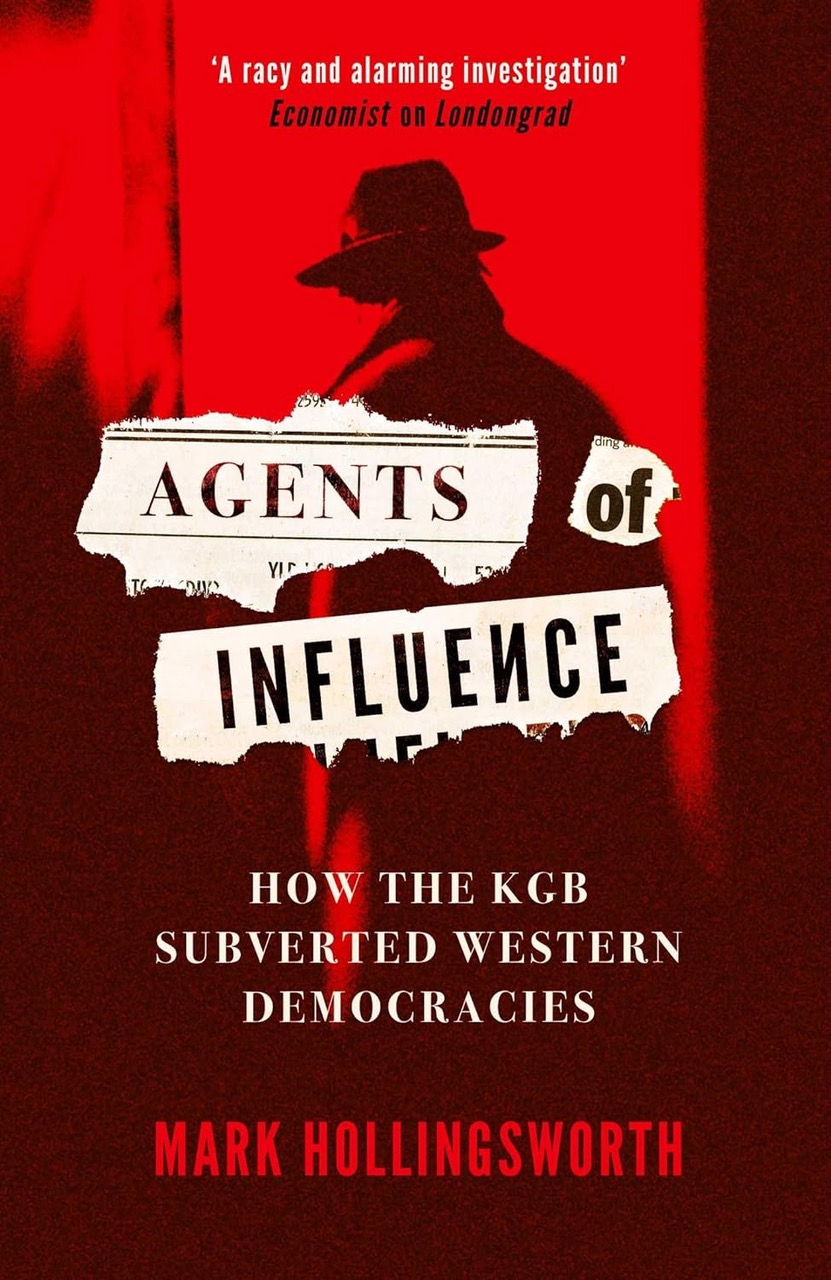 Agents of Influence: How the KGB Subverted Western Democracies
Agents of Influence: How the KGB Subverted Western Democracies
by Mark Hollingsworth
(Oneworld Publications, 16 May 23)
Agents of Influence reveals the secret history of an intelligence agency gone out of control, accountable to no one but itself and intent on subverting Western politics on a near-inconceivable scale. In 1985, 1,300 KGB officers were stationed in the USA. The FBI only had 350 counter-intelligence officers. Since the early days of the Cold War, the KGB seduced parliamentarians and diplomats, infiltrated the highest echelons of the Civil Service, and planted fake news in papers across the world. More disturbingly, it never stopped. Putin is a KGB man through and through. Journalist Mark Hollingworth reveals how disinformation, kompromat and secret surveillance continue to play key roles in Russia’s war with Ukraine. It seems frighteningly easy to destabilise Western democracy.
Order book here.
Book Review - Black Vault - by former CIA analyst Alma Katsu - Amazon Original Stories (2023)
Black Vault is fiction – a short story by a former intelligence analyst who is the author of several books, novellas, psychological thrillers, and science fiction. Best known for The Hunger, an historical fiction about the American West, she also wrote Red Widow, a spy thriller about conflict within the DO’s Russia Division.
Her latest is about a CIA operations officer who observes and reports about an unidentified flying object in remote Mongolia. Needless-to-say he is not believed by many and upsets his managerial hierarchy. The story follows the subsequent psychological travails of the officer. There are lots of interesting elements to Katsu’s story, including the struggle between what one observes and subsequent credibility and the power of public disclosure. Her story also provides an interesting examination of the politics within a CIA station and between headquarters divisions. Throw in the penetration of CIA, à la Larry Wu Tai Chin, and Katsu has written an intriguing short story that is hard to put down once one starts it.
Black Vault is available from Amazon in a print or Kindle version or as an audio book.
Review by AFIO's Peter C. Oleson, Senior Editor of The Intelligencer.
True Intelligence Matters in Film - Spycraft, Episode 5: Covert Communication - Marek Bures, Maria Berry, Jan Spindler (2021)
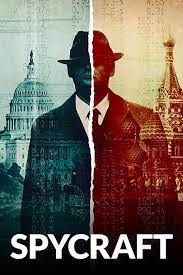 From old-school "dead drops" to high-tech digital transfers: Learn how intelligence officers actually acquire the information collected by sources.
From old-school "dead drops" to high-tech digital transfers: Learn how intelligence officers actually acquire the information collected by sources.
More information about this based-on-true-events production here.
Intelligence in History - A Collection of Recent Content
- The Arab Section: Israel's First Spies with Matti Friedman - Spycraft 101, 17 Dec 23
- Special Operations Executive: Churchill’s Secret Army - Grey Dynamics, 13 Dec 23
- Operation Ajax: CIA and MI6 - Spyscape True Spies Podcast, 11 Dec 23
- The Ghost Army of World War II with Journalist Rick Beyer - Lawfare's Chatter Podcast, 14 Dec 23
- Black Orions! The P-3 Aircraft operated by CIA for Black Flights over China and North Vietnam - The Aviation Geek Club, 13 Dec 23
- Scouts and Spies: Timothy Webster (A true patriot and scout of the Civil War) - Pinkerton, 12 Dec 23
Infographic: Mapped - Interest in Generative AI by Country - Visual Capitalist, 12 Dec 23
In the past two years, AI’s ability to produce text, images, audio, and video has become massively widespread. With millions of people worldwide now embracing tools like ChatGPT and Midjourney to bring their ideas to life, billions of dollars are being invested to take AI technology to the next level. But so far, AI interest by country varies, at least according to search data. This graphic sheds light on the countries most interested in generative AI tools using data compiled by ElectronicsHub. (View graphic here.)
Walking Tours - "Spies of Embassy Row" and "Spies of Georgetown" - Washington, DC - Sundays (Dates/Times Vary)
Former intelligence officers guide visitors on two morning and afternoon espionage-themed walking tours: "Spies of Embassy Row" and "Spies of Georgetown." For more information and booking, click here or contact rosanna@spyher.co
Section VI - Obituaries and Classifieds
(Research Requests, Academic Opportunities, Employment)
(Research Requests, Academic Opportunities, Employment)
Obituaries
![]() Bill Bauhaus — Career NSA Officer
Bill Bauhaus — Career NSA Officer
Louis William Bauhaus, Jr., 82, passed away on Monday, October 30, 2023, at his home in Pasadena, Maryland after a battle with cancer. “Bill” (as he was known by his family and friends) was born and raised in Baltimore, Maryland before moving to Severna Park and Pasadena, Maryland where he lived for the past 55 years. A proud veteran of the United States Navy, he traveled overseas and served as an electronics technician during the Cuban Missile Crisis on the aircraft carrier U.S.S. Enterprise. After his military career, Bill worked as a sound engineer for the rock and roll radio station WCAO before working 38 years for the National Security Agency until his retirement from the government. He was a long-time member of the Phoenix Society.
![]() Russ LeFevre — Decorated Career CIA Officer
Russ LeFevre — Decorated Career CIA Officer
Russell C. LeFevre, aka "Moose," 87, passed on 31 August 2023. Russ was a world traveling adventurer, part pirate and outlaw with a Don Quixote complex and an insatiable curiosity. Russ was born in Vineland, New Jersey and spent his childhood working in the White Sparrow Inn, the LeFevre family-owned restaurant. At age fifteen he ran away from Valley Forge Military Academy after painting the parade ground cannon purple. After graduating from Elizabethtown College, he enlisted in the Navy and graduated from Office Candidate School, in Newport, RI. Following his military service, he was recruited into the CIA where he worked and thrived for more than 30 years, supporting programs during the Vietnam conflict, the Afghan Task Force, and Central American operations. During his career he learned to fly both power planes and gliders, how to parachute. He was a master scuba diver and an intrepid sailor. He played classical piano and sang opera with the Singapore International Chorus. His first agency assignment was to assist a senior officer to conduct the rescue of American officials surrounded by rebels in Stanleyville, Congo. Next assignment was Pakse, Laos. French language training followed with a year in Douala, Cameroon. His subsequent assignments were Cambodia, Thailand, Australia, Belize and Singapore. During his tenure with the Agency, he received a citation for meritorious service, two certificates of exceptional service, four-unit citations for meritorious or exceptional service and received the CIA Medal of Merit for courageous action in the field. His various assignments involved both overt and covert paramilitary operations. He retired in 1993, but after 9/11 he returned to the CIA as a part time instructor for new young officers and worked until his 80th birthday. He was a true patriot.
![]() Dave Hartmann — Decorated Career NSA Officer
Dave Hartmann — Decorated Career NSA Officer
David A. Hartmann, 80, passed on 29 November 2023. Dave was born in Evansville, Indiana. He graduated from Mater Dei High School in 1961 and enlisted in the U.S. Army. After serving in Japan and upon his release from the Army in 1965, he returned to Indiana where he attended the University of Evansville. Upon graduating from college, he started a lifelong career, to which he was dedicated, with the National Security Agency (NSA). He served with the NSA at Fort Meade, Maryland, and completed tours of duty in the United Kingdom, West Germany, and Bosnia, retiring in 1999. During this time Dave received a commendation from the Director of the NSA for his efforts surrounding the release of the hostages in Iran, two Meritorious Civilian Service Awards, the Director of National Intelligence Award for Collaborative Leadership, and a North Atlantic Treaty Organization Service of Freedom Medal. Following the events of September 11, 2001, he returned to duty at NSA serving an additional 13 years. Dave was a former member of the Phoenix Society.
Research Requests and Academic Opportunities
- National Intelligence Summer Academy (NISA) for High School Students: 15-19 July 2024. University of Northern Georgia - Cumming Campus. $149 fee covers meals, course materials, and the motor coach travel on the last day of the program. Scholarships available. Application deadline 15 April 2024. More information, including eligibility and application, here.
- Call for Interviews: Alex W. Palmer, a contributing writer at The New York Times Magazine, is working on a book about the history of American intelligence on China. He's looking to speak with any intelligence officers who worked in or on China during their career, from whatever timeframe and in whatever role. He can be reached at alex.palmer@nytimes.com and +1-262-894-7160 on Signal.
- Call for Information: Dr. Andrew Hammond and Dr. Mark Stout are seeking interviewees for a journal article on the CIA’s Office of Soviet Analysis (SOVA). The final output will be based on oral history interviews which can be (a) on-the-record (b) off-the-record or (c) utilizing a pseudonym. The data will be used for this project only and thereafter destroyed. Our aim is to understand how people who served in SOVA or who worked alongside SOVA made sense of it: what was it like, what was its culture, what were its strengths and weaknesses, how did it relate to the rest of the CIA and other agencies, is there anything we can learn from SOVA re the new era of Great Power Conflict, etc.? If you served in SOVA during the period 1981 to 1992 and would like to be interviewed, please contact Dr. Andrew Hammond at ahammond@spymuseum.org.
- Call for Information: Seeking information on Al "Albert" Purdum, stationed at Arlington Hall 55, Defense Language School - Albanian 55-56, NSA Linguist, Sr. Cryptologist 57-95. Looking for colleagues or friends who knew him, of him. Researching Role of National Security Linguists and Foreign Affairs. Contact cristina.purdum@gmail.com.
- Call for Information: Seeking information on Octavio Bermudez, State/Commerce Attache Latin America Crosley Broadcasting- 1922-1942. Sources needed - Passenger list of Hoover's 1928 Good Will Tour, Details/objectives by country, 25 year agreement with Ecuador to build broadcast station in Quito- role in Open Source Enterprise, WWII locating Axis Spies, American Propaganda/Spy Communication Network. 41-46 OCIAA propaganda, embedded code/scripts for broadcast, hand delivered to Crosley, Cincinnati - the only fenced compound, with 24 hr. armed guards, watch tower. Researching Role of Foreign Service Attaches - Development of American Broadcasting Capabilities pre WWII in Latin America. Contact cristina.purdum@gmail.com.
- Call for Information: Author drafting a book on the Clinton administration seeks contact with the person who served as COS Manila in November 1996 for the purpose of background research. Members who can identify the COS and/or are in contact with him, please forward this request to the COS or contact the author. Responses may be sent to dpluchinsky@rocketmail.com.
- Call for Information: Seeking information on, Sgt Major Charles “Chuck” Remagen, assigned to MACV/SOG in Vietnam 67-68. Seek details about his role as a Sgt Major with MACV “Studies and Observations Group in Vietnam 7/1/67 to 1/21/68. Responses may be sent to magen@hotmail.com.
- Call for Sources: Intelligence activities in Grenada and the southern Caribbean between 1979 and Operation Urgent Fury, Leonard Barrett
- Call For Articles: AFIO Journal, The Intelligencer
The Washington Post is developing a multi-part audio documentary series chronicling the Grenadian revolution and the US intervention in 1983. They have interviewed nearly 100 individuals so far--heads of state, former Grenadian officials, current and former US officials, veterans, and intelligence officers. They are interested in speaking to individuals who served at the time and are knowledgeable about intelligence activities in Grenada and the southern Caribbean between 1979 and Operation Urgent Fury, and persons who knew Leonard Barrett during the same period. If you are interested in participating, contact Washington Post reporter Ted Muldoon at ted.muldoon@washpost.com or on Signal at 651-497-5449.
AFIO is seeking authors for its section on "When Intelligence Made a Difference" in the semi-annual Intelligencer journal. Topics of interest for which we are seeking authors include:
- The Richard Sorge espionage ring in Tokyo in World War II and
the impact of his intelligence on Stalin and the battle for Moscow.
- How Rommel’s Afrika Korps used SIGINT against the British in
World War II.
- How A.Q. Khan’s nuclear proliferation efforts were uncovered
and stopped.
- The breaking of the Nazi U-boat SHARK encryption system.
- How US intelligence found Usama Bin Laden in Abbottobad, Pakistan.
- How allied SIGINT isolated the Afrika Korps from its logistics chain.
- How US intelligence discovered the Soviet’s high speed Shkval torpedo.
- Intelligence and the rescue of Scott O’Grady.
- Other topics are also welcome.
Interested authors can contact The Intelligencer's senior editor, Peter Oleson, at peter.oleson@afio.com
Jobs
- Wanted: Retired Federal Government Employees - NSA - Fort Meade, Maryland
- Assistant/Associate Professor of Intelligence Studies (Global Security and Intelligence Studies) - Embry-Riddle Aeronautical University - Prescott, Arizona
The National Security Agency (NSA) may occasionally need skilled civilian retirees to augment the existing work force on high priority projects or programs. In order to fill these temporary positions quickly, we need to know who may be interested and available to return to work with us on a short notice basis as well as their skills. Retired federal government employees at NSA provide expertise and corporate knowledge to temporarily support mission requirements, manpower shortfalls, and/or mentor the next generation of Agency employees. Applications accepted until 30 September 2024.
Additional information and application here.
Embry-Riddle Aeronautical University's Prescott, Arizona campus is accepting applications for a tenure-track assistant or associate-level professor of intelligence studies to teach intelligence courses to students in the Global Security and Intelligence program. The successful candidate will teach students about the intelligence community, strategic intelligence, the intelligence cycle and intelligence analysis, writing, and briefing. Prior experience working in the intelligence community is strongly preferred. We are interested in candidates with teaching acumen in intelligence analysis and writing using structured analytical techniques.
Additional information and application here.
30 Jan 24, 1900 (PST) - Former CIA Director General David Petraeus on challenges in Ukraine and across the Middle East - In-Person - Yorba Linda, CA - AFIO Los Angeles Chapter.
Location: Nixon Presidential Library & Museum, 18001 Yorba Linda Blvd, Yorba Linda, CA 92886. Following the presentation, we will meet at 2030 hours for dinner at Chilis Grill (18380 Yorba Linda Blvd.). If you plan to attend, please RSVP here. Questions? Contact Vincent Autiero, President, AFIO-Los Angeles Chapter, at afio_la@yahoo.com
Events from Advertisers, Corporate Sponsors, Others
 NEW Gray long-sleeved polo shirts with embroidered AFIO logo. Men's sizes only.
NEW Gray long-sleeved polo shirts with embroidered AFIO logo. Men's sizes only.
Show your support for AFIO with our new Gray Long-sleeve Polo Shirts. Shirts are shrink and wrinkle resistant of fine cotton with a soft, "well-worn, comfy" yet substantial feel. They feature a detailed embroidered AFIO seal. Get a shirt for yourself and consider as gifts for colleagues, family, and friends. Only $60 each including shipping.
Sizes for men, only: Small, Medium, Large, XL, XXL, and XXXL. $60 per shirt. Order this and other store items online here.
 NEW 20 oz ceramic Mug with color glazed logo. Made in America. Check out our new tapered, sleek AFIO coffee mug!! This handsome 20 oz. ceramic mug is made in the USA, has a white matte exterior, sports a beautiful navy-blue interior, and is dishwasher safe. Order yours today! $35 per mug includes shipping to a CONUS address. [includes shipping to U.S. based address, only. For foreign shipments, we will contact you with a quote.] SHIPPING: For shipment to a U.S.-based CONUS address, shipping is included in price. For purchases going to AK, HI, other US territories, Canada, or other foreign countries the shipping fees need to be calculated, so please call our office M-F 8 a.m. to 2 p.m. ET at 703-790-0320 or email afio@afio.com providing following information: 1) your name, 2) mailing address (or addresses where each gift item will be shipped), 3) name of the AFIO store items you wish to purchase, 4) quantity of each, 5) your credit card number and expiration date, 6) amount (except for additional of shipping fees) authorized to charge, and 7) your phone number and email should we have questions. Foreign shipments fees will be calculated and estimates emailed to you, awaiting your approval. Order this and other store items online here.
NEW 20 oz ceramic Mug with color glazed logo. Made in America. Check out our new tapered, sleek AFIO coffee mug!! This handsome 20 oz. ceramic mug is made in the USA, has a white matte exterior, sports a beautiful navy-blue interior, and is dishwasher safe. Order yours today! $35 per mug includes shipping to a CONUS address. [includes shipping to U.S. based address, only. For foreign shipments, we will contact you with a quote.] SHIPPING: For shipment to a U.S.-based CONUS address, shipping is included in price. For purchases going to AK, HI, other US territories, Canada, or other foreign countries the shipping fees need to be calculated, so please call our office M-F 8 a.m. to 2 p.m. ET at 703-790-0320 or email afio@afio.com providing following information: 1) your name, 2) mailing address (or addresses where each gift item will be shipped), 3) name of the AFIO store items you wish to purchase, 4) quantity of each, 5) your credit card number and expiration date, 6) amount (except for additional of shipping fees) authorized to charge, and 7) your phone number and email should we have questions. Foreign shipments fees will be calculated and estimates emailed to you, awaiting your approval. Order this and other store items online here.
 Black short-sleeved polo shirts with Embroidered AFIO logo
Black short-sleeved polo shirts with Embroidered AFIO logo
Show your support for AFIO with our new Black Short-sleeve Polo Shirts. Shirts are shrink and wrinkle resistant of fine cotton with a soft, "well-worn, comfy" yet substantial feel. They feature a detailed embroidered AFIO seal. Get a shirt for yourself and consider as gifts for colleagues, family, and friends. Only $50 each including shipping.
Sizes for (M) men, only; Small, Medium, Large, XL, XXL, and XXXL. $50 per shirt.
You may pay by check or credit card. Complete your order online here or mail an order along with payment to: AFIO, 7600 Leesburg Pike, Ste 470 East, Falls Church, VA 22043-2004. Phone orders at 703-790-0320. Questions? Contact Annette at: annettej@afio.com.

PopSocket for cellphones or tablets
Show your support to AFIO while enjoying the convenience offered by our AFIO Logo PopSocket. The PopSocket is most commonly used as a stand and as a grip for your mobile phone or tablet; handy for taking selfies, watching videos, and for texting. The PopSocket looks like a small button or sticker which, when closed, sticks flat to your mobile device. However, its accordion-like design enables it to pop open for use. The benefits of using a PopSocket make it a must-have accessory for your mobile phone or tablet. It also aids in keeping your phone from slipping off your hand during use, falling, or breaking.
Price: $15. Order this and other store items online here.

Duffel Bags - Royal Blue and Black with Full Color AFIO Logo This duffel has it all when it comes to value, style and organization.
600 denier polyester canvas with polyester double contrast; D-shaped zippered entry for easy access. Front pocket with hook and loop closure. End mesh pocket Easy-access end pockets. Four durable, protective feet and built-in bottom board for added strength. Web handles with padded grip. Detachable, adjustable shoulder strap.
Dimensions: 11"h x 19.75"w x 9.75"d; Approx. 2,118 cubic inches
Price: $50. Order this and other store items online here.

Caps - Dark Navy with Navy AFIO Logo
An authentic silhouette with the comfort of an unstructured, adjustable fit. Fabric: 100% cotton. Unstructured. Fabric strap closure with adjustable D-clip. Price: $30. Order this and other store items online here.
| PUBLISHED
IN 2023 Be informed on career opportunities in the U.S. Intelligence Community |
||
 |
Intelligence as a Career - with updated listings of colleges teaching intelligence courses, and Q&As on needed foreign languages, as well as the courses, grades, extracurricular activities, and behavioral characteristics and life experiences sought by modern U.S. intelligence agencies. AFIO's popular 47-page booklet reaches thousands of high school, college students, university guidance offices, and distributed in classes teaching intelligence, to help those considering careers in the U.S. Intelligence Community. |
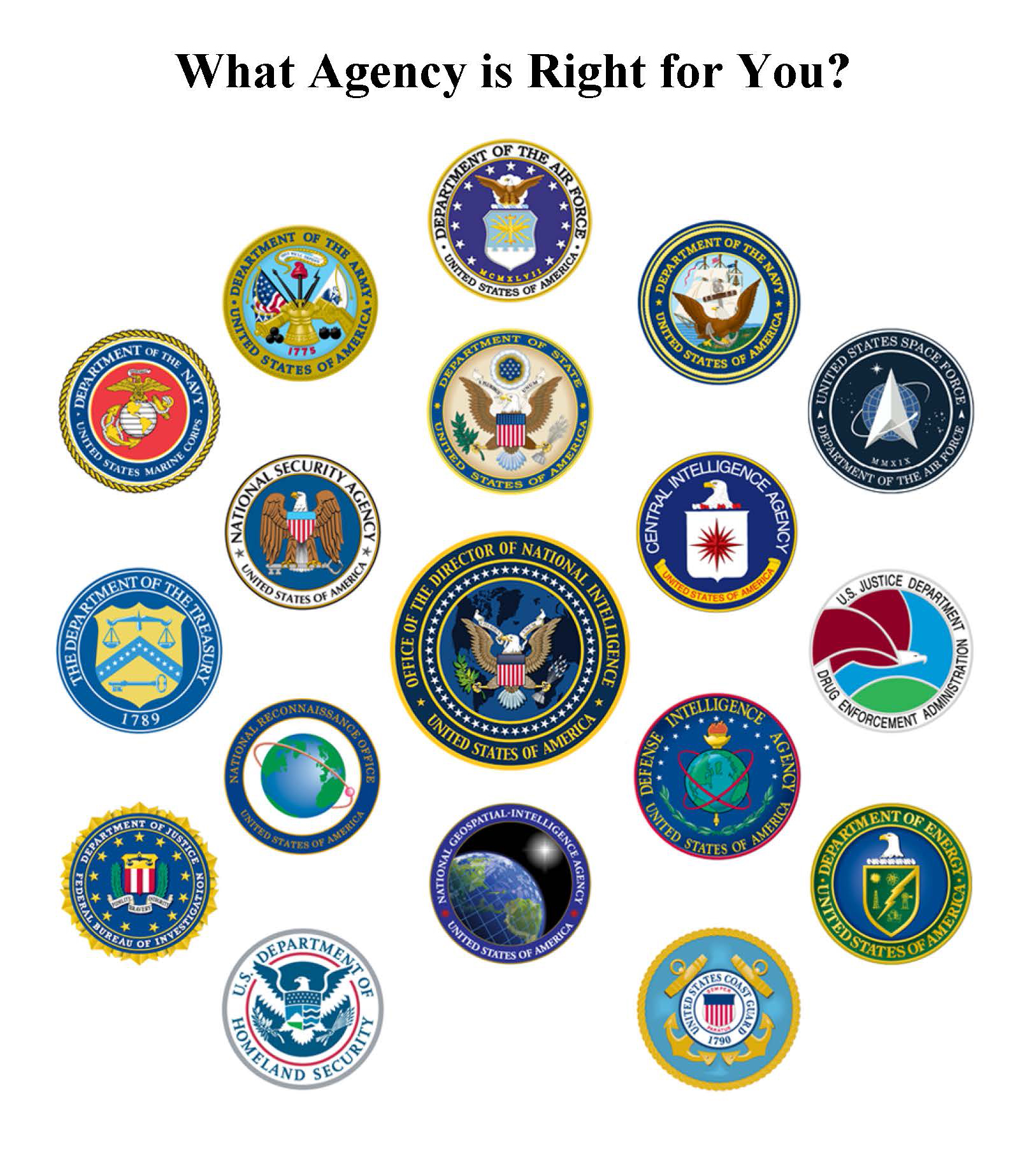 |
| This is the all new fifth edition. The publication is also popular with University Career Guidance Centers, professors and academic departments specializing in national security, and parents assisting children or grandchildren in choosing meaningful, public service careers. This booklet is provided online as a public service from the generosity of AFIO board, volunteer editors/writers, donors, and members. We thank all for their support which makes this educational effort possible. |
||
| Careers Booklet (new 2023 Fifth Edition) can be read or downloaded here |
||
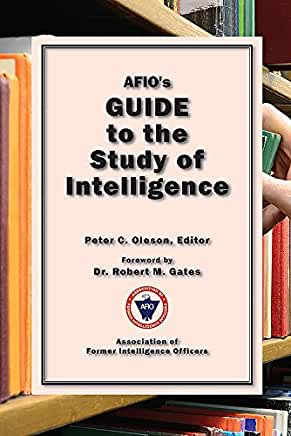 Guide to the Study of Intelligence...and...When Intelligence Made a Difference
Guide to the Study of Intelligence...and...When Intelligence Made a Difference
"AFIO's Guide to the Study of Intelligence" has sold out in hard-copy.
It is available in digital form in its entirety on the
AFIO website here.
Also available on the website here are the individual articles of AFIO's
history project "When Intelligence Made a Difference" that have been
published to date in The Intelligencer journal.
More articles will be appear in future editions.
Some features of the email version of the WIN do not work for readers who have chosen the Plaintext Edition, some AOL users, and readers who access their email using web mail. You may request to change from Plaintext to HTML format here afio@afio.com. For the best reading experience, the latest web edition can be found here: https://www.afio.com/pages/currentwin.htm
To unsubscribe from the WIN email list, please click the "UNSUBSCRIBE" link at the bottom of the email. If you did not subscribe to the WIN and are not a member, you received this product from a third party in violation of AFIO policy. Please forward to afio@afio.com the entire message that you received and we will remove the sender from our membership and distribution lists.
(c) 1998 thru 2023
AFIO Members Support the AFIO Mission - sponsor new members! CHECK THE AFIO WEBSITE at www.afio.com for back issues of the WINs, information about AFIO, conference agenda and registrations materials, and membership applications and much more!
AFIO | 7600 Leesburg Pike, Suite 470 East, Falls Church, VA 22043-2004 | (703) 790-0320 (phone) | (703) 991-1278 (fax) | afio@afio.com


